We send birthday wishes to IM George Steven Botterill born on this day (January 8th) in 1949.
Here is his Wikipedia page
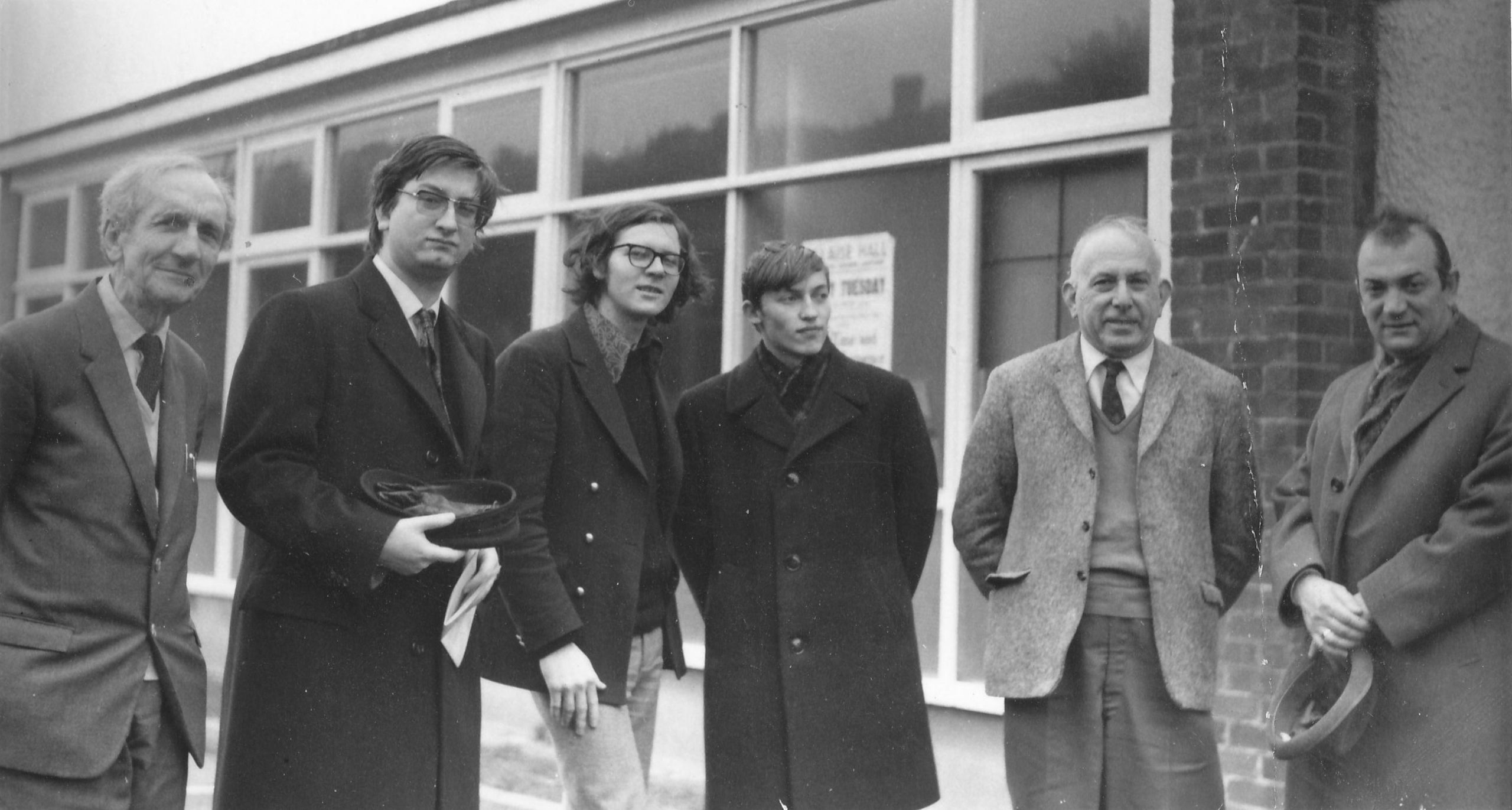
and here is his academic page
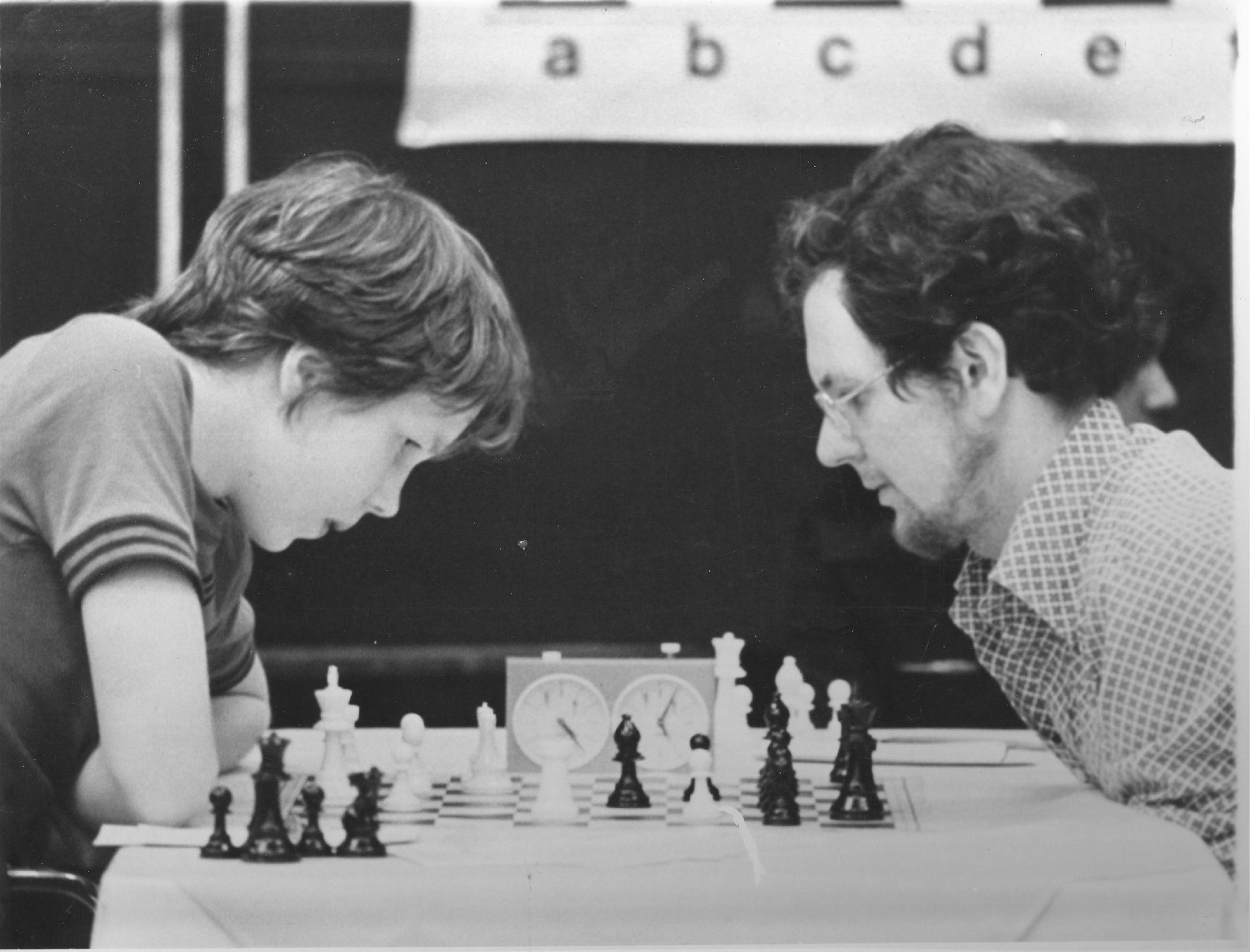
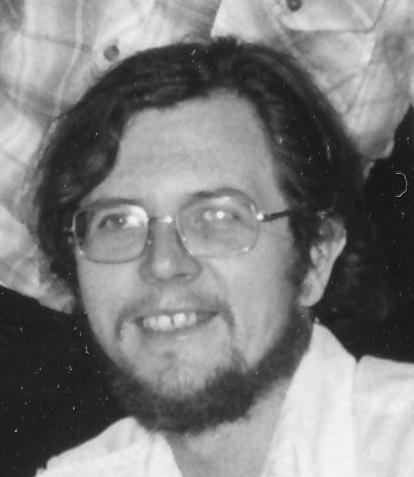
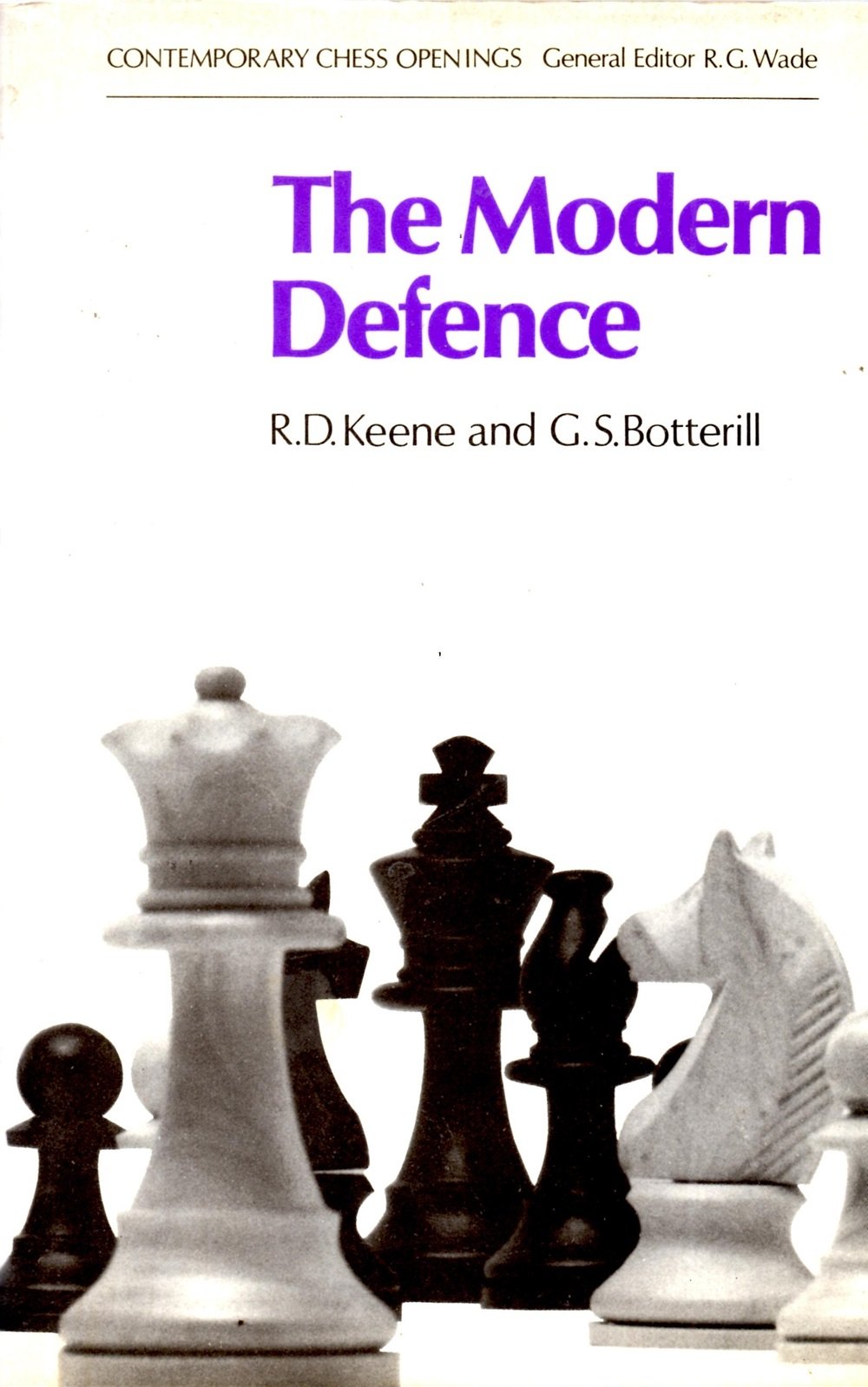
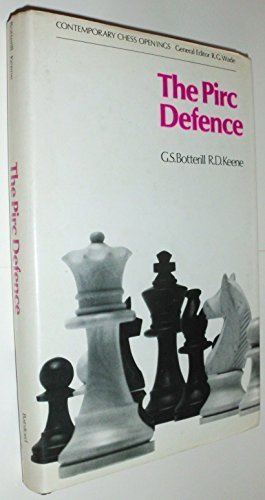
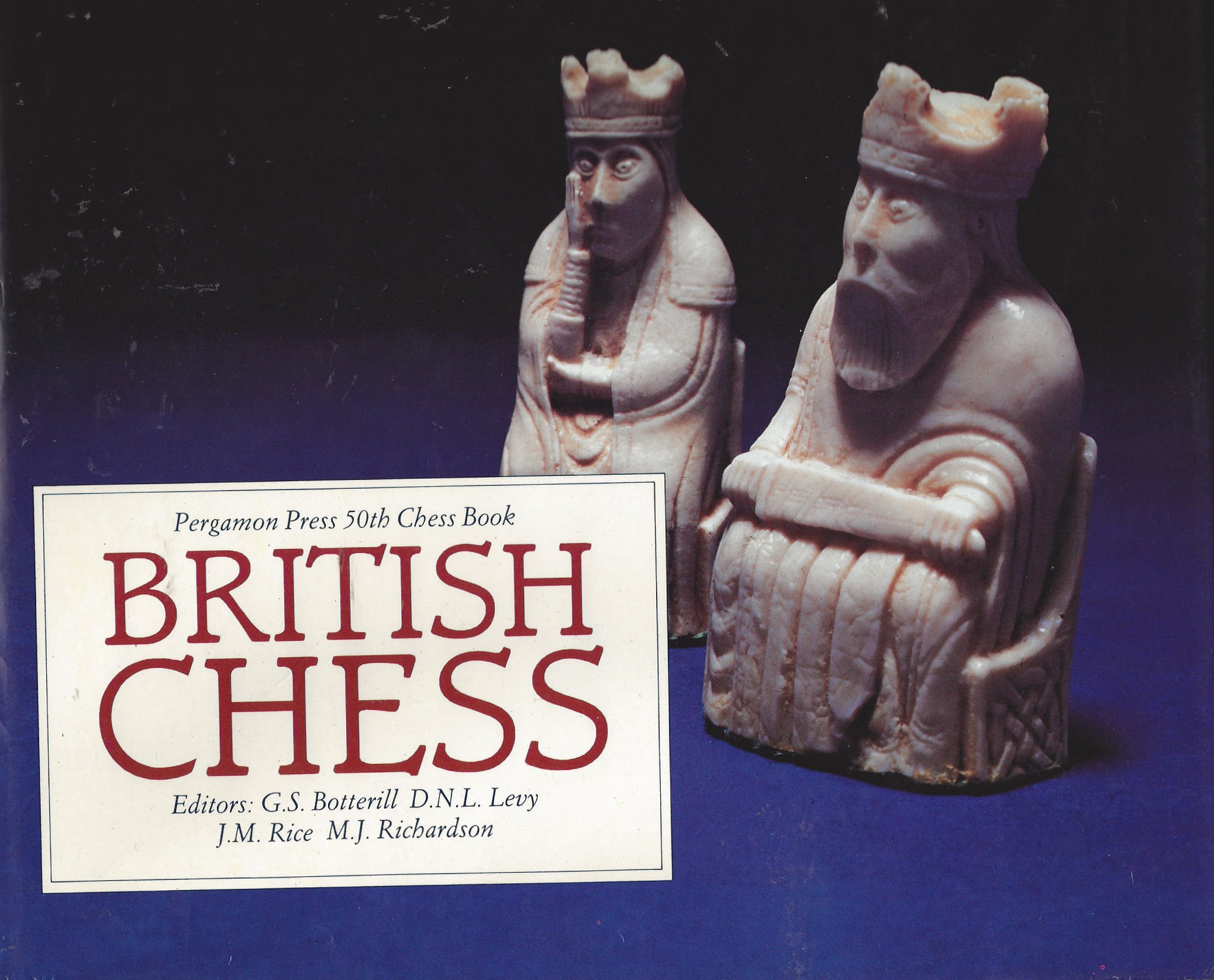
We send birthday wishes to IM George Steven Botterill born on this day (January 8th) in 1949.
Here is his Wikipedia page

and here is his academic page





We send birthday wishes to IM George Steven Botterill born on this day (January 8th) in 1949.
Here is his Wikipedia page

and here is his academic page





We send birthday wishes to IM George Steven Botterill born on this day (January 8th) in 1949.
Here is his Wikipedia page

and here is his academic page





We remember Samuel Boden, who passed away on this day, Friday, January 13th in 1882 at 3 Tavistock Street, Bedford Square, Middlesex.
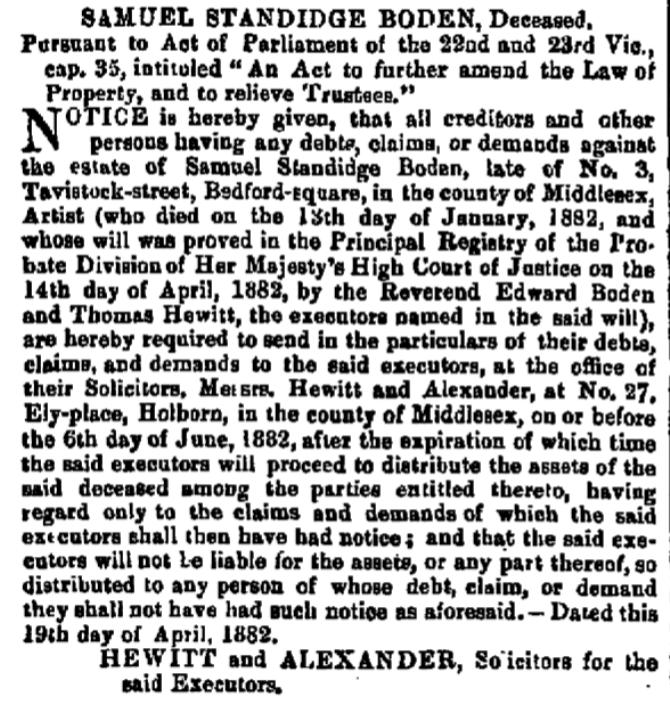
Samuel Standidge Boden was born on Thursday, May 4th, 1826 in East Retford, Nottinghamshire. His parents were James (b. 1795/96) and Mary Frances Boden (b. 1800/01).
(Several secondary and tertiary sources give the birth month as April. It would appear that a transcription error was responsible.)
James was an Independent Congregational Minister who worked in West Retford and was responsible for recording parish birth and baptismal (and probably marriage) records including those of his own children.
Samuel was baptised by his father (for the first time!) on July 27th at Chapel Gate (independent) Church.

Samuel had at least nine siblings and the details of these plus other family members (including multiple baptisms) may be found on Steve Mann’s Yorkshire Chess History.
From The Encyclopaedia of Chess by Anne Sunnucks :
“Boden was considered by Paul Morphy to be the strongest player in England in 1858. However, he is generally considered to have ranked below Staunton and to have been either the second of third strongest player, the other player being Buckle.
Born in Hull on 4th April 1826, Boden first came to the notice of British chess players when he won a provincial tournament in 1851. In 1858 he played two matches against John Owen , winning both, the first by +5 -3 =1 and the second by +5 -1. He played in very few major tournaments and his strength ws judged mainly from friendly games and small tournaments. He was the author of A Popular Introduction to Chess and conducted the chess column in The Field for 13 years.
He died of typhoid fever on 13th January 1882 and is buried in Woking, Surrey.”
According to Steve Mann :
“He was buried on 17/01/1882 at Brookwood Cemetery, Brookwood, Surrey. This cemetery was also known as the London Necropolis, having been specially instituted to take London’s dead at a time when space within London was becoming scarce. A transcription of the Surrey Burial Registers gave his name as “Samuel Standage Boden” and his age to be 55. The burial date, the deceased’s age, and the nature of the cemetery, together make it clear this was the chess-player, even though they misspelt his middle name.”
From The Oxford Companion to Chess by David Hooper & Ken Whyld :
English player active in the 1850s. In 1851 he wrote A Popular Introduction to the Study and Practice of Chess, an excellent guide introducing the Boden-Kieseritzky Gambit which at once became popular. In the same year he won the ‘provincial tournament” run concurrently with the London international tournament. At Manchester 1857, a knock-out event, he came second to Lowenthal— he drew one game of the final match and then withdrew. In 1858 Boden defeated Owen in a match ( + 7=2-3) and he played many friendly games with Morphy, who declared him to be the strongest English player; since Staunton and Buckle had retired this judgement was probably right. Also in 1858 he restarted the chess column in The Field , handing over to de Vere in 1872. The column has continued uninterruptedly ever since. Besides chess and his work as a railway company employee Boden found time to become a competent amateur painter and an art critic.
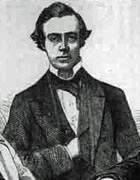
From The Encyclopaedia of Chess by Harry Golombek OBE :
British master, considered by Morphy to have been the strongest opponent whom he played while in England (Boden’s record against Morphy in casual games was +1-6=4). Tournament results include 2nd Manchester 1857 and 2nd Bristol 1861. Chess editor of The Field 1858-1873. His name is linked with the Boden-Kieseritsky Gambit : 1.e4 e5 2.Bc4 Nf6 3.Nf3 Nxe4 4. Nc3 Nxc3 5.dxc3 f6 (article authored by Ray Keene).
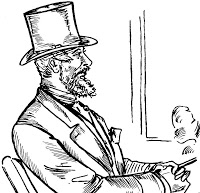
Most players will be familiar with this mating pattern that is Boden’s Mate using two bishops in a cross pattern.
Here is an example puzzle from 1001 Chess Exercises for Club Players that demonstrates the pattern :
White to play and checkmate.
Here is an in-depth article about Boden’s Mate from Edward Winter
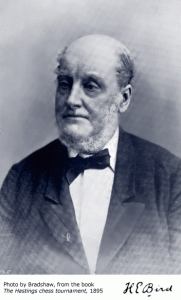
Death Anniversary of Henry Edward Bird (14-vii-1829 11-iv-1908)
From The Oxford Companion to Chess by David Hooper & Ken Whyld :
“English player, accountant. He played in 13 strong tournaments, with erratic results; his best achievements were: Vienna 1873, a tie with L. Paulsen for fifth place; Paris 1878, fourth place shared with Mackenzie; Manchester 1890. third prize shared with Mackenzie after Tarrasch and Blackburne. He also played in numerous minor tournaments, notably tying with Gunsberg for first prize at London 1889. His most important match was against Steinitz in 1866 for the first to win eleven games. He was adjudged the loser when he was
called to the USA on business, the score standing +5 = 5—7 in favour of his opponent. This was a creditable result in the circumstances, for he played each game after a day’s work (Steinitz, however, was not so strong a player as he later became.) In 1886 Bird drew a match with Burn(+ 9—9). One of the most ingenious tacticians of his time, Bird played in the attacking style prevalent in his youth. He usually chose openings that were regarded as bizarre, although many of them, e.g. the Dragon Variation, have since gained acceptance.
Bird was probably the best known and longest serving habitue of the London coffee-house known as Simpson’s Divan. ‘A rosy-cheeked, blue-eyed, fair-headed boy’, he first attended around 1846 and was a constant visitor for more than 50 years, after which he was described as ‘majestic in stature, in girth, in the baldness of his great head, less majestic in the litter of tobacco ash upon his waistcoat … with a pleasant smiling countenance’. He suffered from gout which eventually so incapacitated him that he was largely confined to his home for the last years of his life.
Besides writing booklets on railway finance he wrote several books on chess. They are not without interest although the content is sometimes inaccurate and often disorganized. Bird’s Modern Chess and Chess Masterpieces (1887) contains more than 200 games, about half of them his own. Chess History and Reminiscences (1893) contains an account of contemporary players and chess affairs.
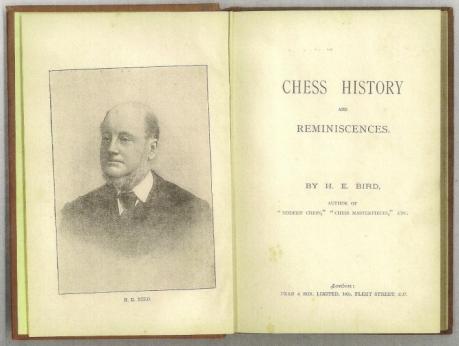
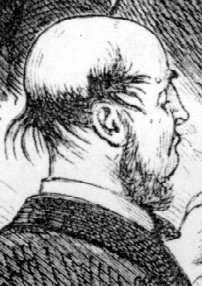
Bird-Mason New York 1876 French Defence, Exchange Variation :
For this game Bird was awarded the BRILLIANCY PRIZE.
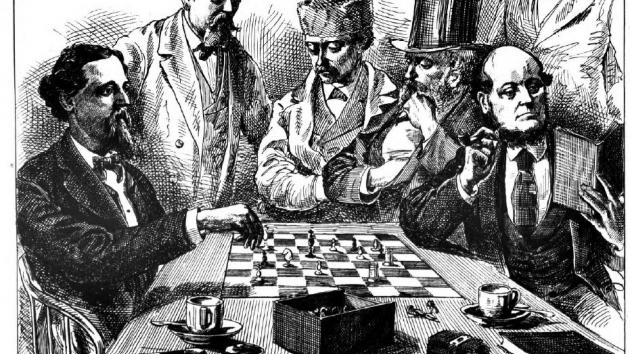
The Bird Attack is variation in the Italian opening strongly advocated by Stamma and no less strongly by Biro. In May 1843 saint-Amant played it against Staunton in their first match and five years later Bird adopted the variation, playing it in many tournaments, notably with fair success at Vienna 1882, London 1883, and Nuremberg 1883.
The Bird Defence, a reply to the Spanish opening given in the first edition of Bilguer’s Handbuch, 1843. Pioneered by Bird, e.g. against Anderssen in 1854, and used on occasion by grandmasters such as Tarrasch, Spielmann, and Spassky, this defence has not gained wide acceptance.
The Bird Opening, sometimes called the Dutch Attack by analogy with the Dutch Defence. In 1873, after an absence of six years from chess, Bird played a match with Wisker. ‘Having forgotten familiar openings, I commenced adopting KBP for first move, and finding it led to highly interesting games out of the usual groove, I became partial to it. ’ Bird had also forgotten unfamiliar openings, for
1 f4 (given by Lucena) had been played by Bourdonnais, Williams, and others of that period. However Bird’s consistent adoption of the move led to its becoming a standard opening, although
never popular.
From Wikipedia :
Henry Edward Bird (Portsea in Hampshire, 14 July 1830 – 11 April 1908) was an English chess player, and also an author and accountant. He wrote a book titled Chess History and Reminiscences, and another titled An Analysis of Railways in the United Kingdom.
Although Bird was a practicing accountant, not a professional chess player, it has been said that he “lived for chess, and would play anybody anywhere, any time, under any conditions.”
At age 21, Bird was invited to the first international tournament, London 1851. He also participated in tournaments held in Vienna and New York City. In 1858 he lost a match to Paul Morphy at the age of 28, yet he played high-level chess for another 50 years. In the New York tournament of 1876, Bird received the first brilliancy prize ever awarded, for his game against James Mason.
In 1874 Bird proposed a new chess variant, which played on an 8×10 board and contained two new pieces: guard (combining the moves of the rook and knight) and equerry (combining the bishop and knight). Bird’s chess inspired José Raúl Capablanca to create another chess variant, Capablanca Chess, which differs from Bird’s chess only by the starting position.
It was Bird who popularized the chess opening now called Bird’s Opening (1.f4), as well as Bird’s Defense to the Ruy Lopez (1.e4 e5 2.Nf3 Nc6 3.Bb5 Nd4). Bird’s Opening is considered sound, though not the best try for an opening advantage. Bird’s Defense is regarded as slightly inferior, but “trappy”.
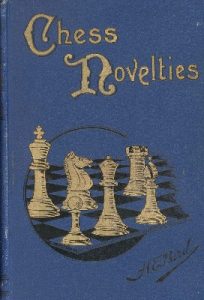
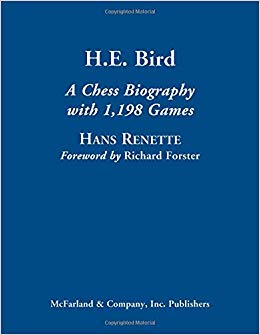
We remember Henry Atkins who passed away, Monday, January 31st, 1955.
Henry Ernest Atkins was born in Leicester on Tuesday, August 20th, 1872 to Edward (a schoolteacher) and Jane Atkins (née Threapland).
He was baptised on August 6th, 1872 in the Anglican Cathedral Church of St. Martin, Leicester. At the time of the baptism the Atkins family was living at 57, King Richard’s Road, Leicester. The address in 2021 appears to be occupied by an industrial premise for Sunco Knitwear Specialists. The signatory on the baptism record is that of DJ Vaughan.

Henry was admitted to Wyggeston Boys Grammar School, Leicester on March 30th 1880 when eight years old. He was expected to leave at the end of the Winter Term in 1890.

Curiously his school admission record includes the following addition (although we don’t know exactly when) :
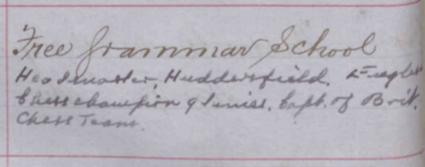
Henry, aged 18, went up to Peterhouse College, Cambridge in 1890 to study mathematics. From his year of entry he was ranked as 9th “Wrangler” studying for the Mathematical Tripos. As part of his Part II examinations he did well enough to be “mentioned” for the Smith’s Prize for examination performance.
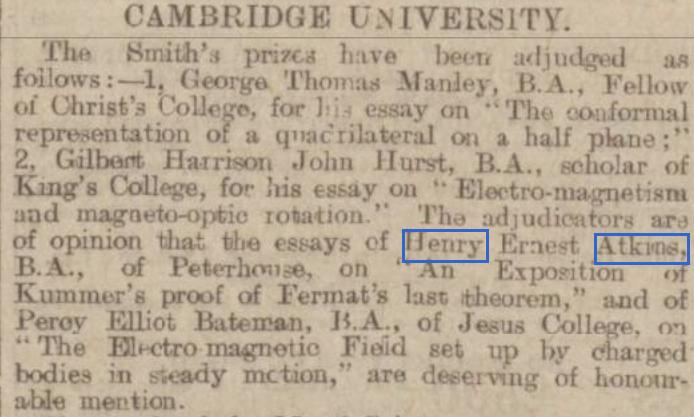
(Here is more on Kummer’s Proof of Fermat’s Last Theorem.)
Following University Henry became a teacher of mathematics at Northampton County Modern School and then returned to Wyggeston Boys Grammar School from 1902 – 1908. He then became the principal of Huddersfield College in 1909 and continued until 1915. Huddersfield College (founded in 1839) was merged with Hillhouse Technical School to form a new boys’ grammar school at a new campus at Salendine Nook with 950 boys.
According to Ranneforths Schach-Kalender (cited by C.N.), 1915, page 55, during the period at Huddersfield College Henry lived firstly at 49 New North Road, Huddersfield, Yorkshire :
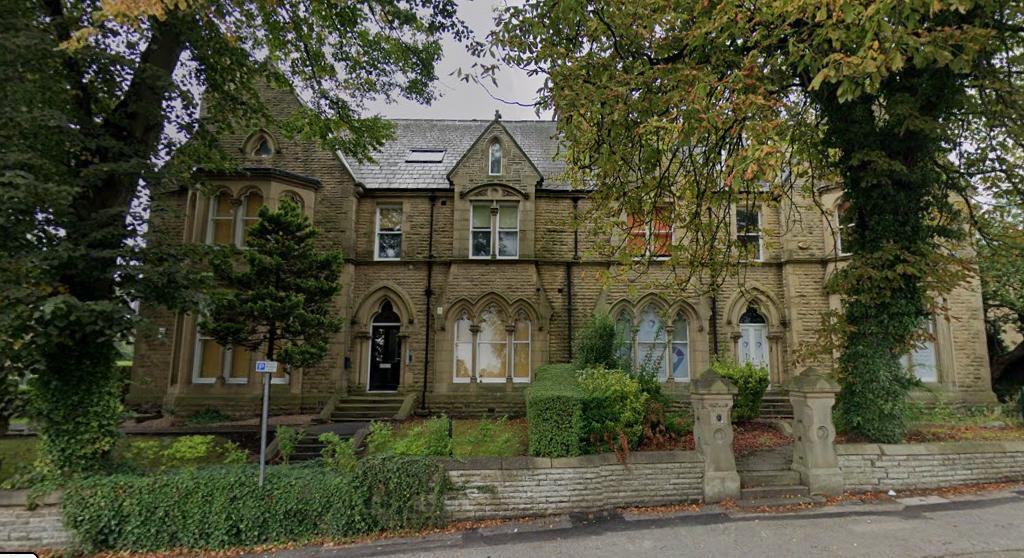
and then
36 Gledholt Road, Huddersfield, Yorkshire, HD1 4HP :
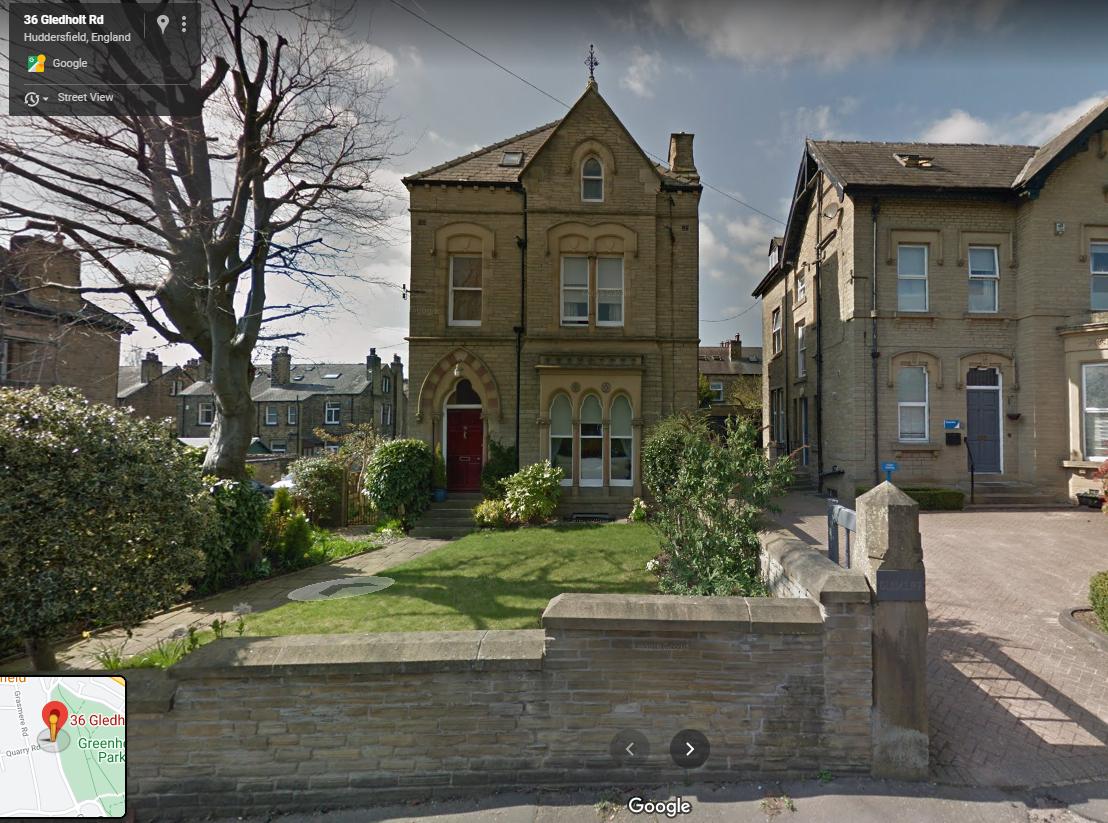
On June 1st, 1915 (aged 43) Henry was registered as a teacher whilst at Huddersfield College for the fee of one guinea :
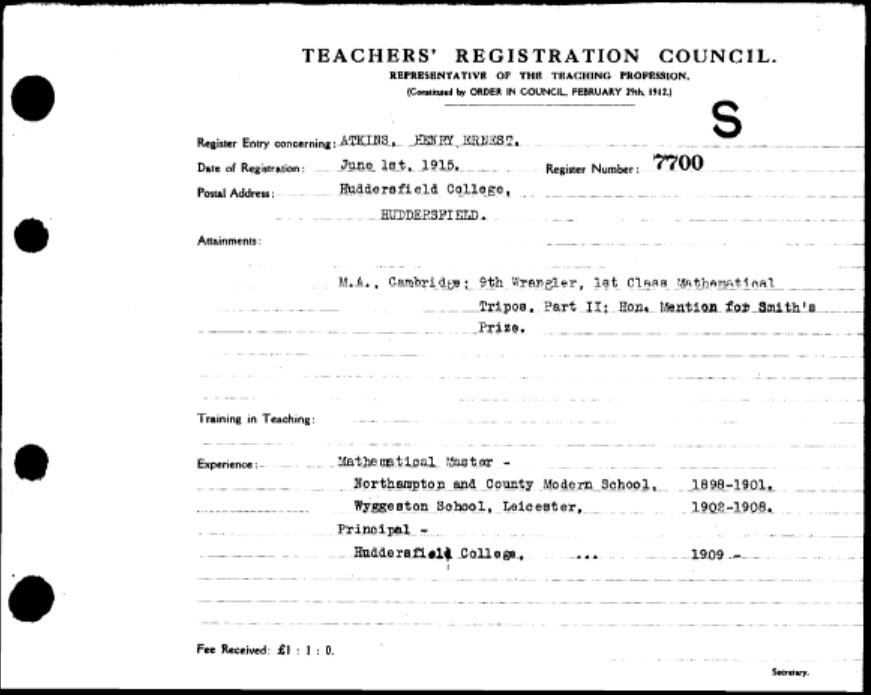
Henry retired from teaching in 1936.
In the 1939 register Henry (now a retired schoolmaster) was recorded as living with his wife, Elspeth Skene Atkins (née Wilson) at 29 East Avenue, Leicester, Leicestershire :
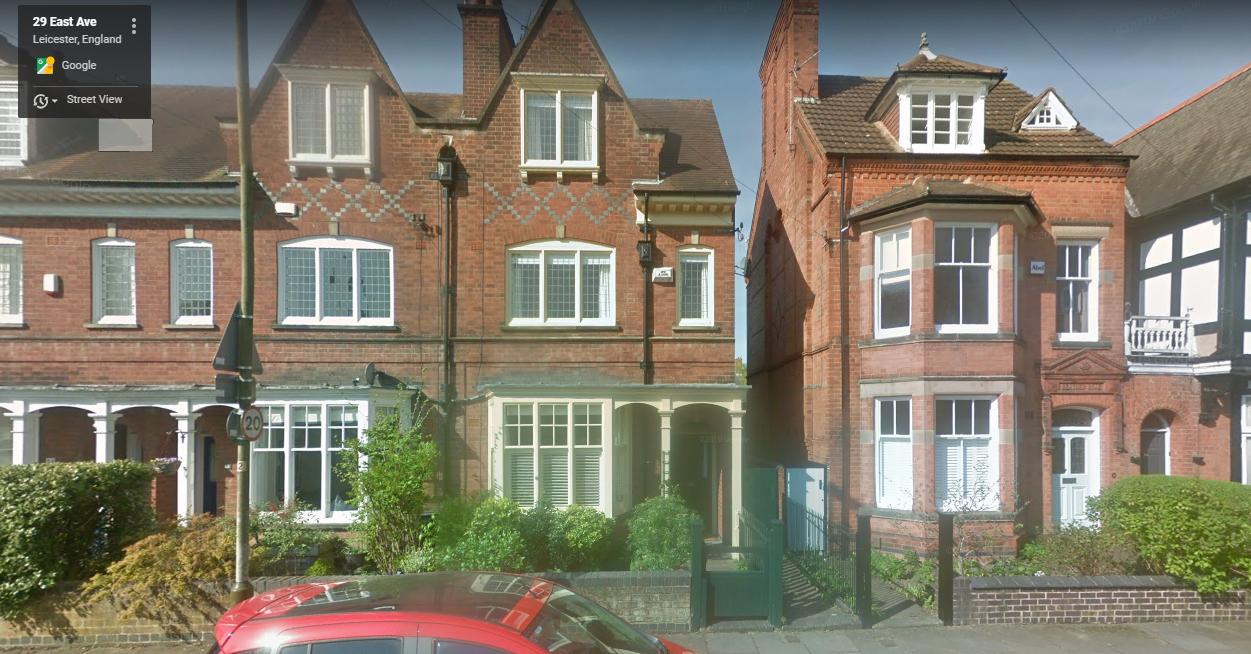
Elspeth was born on August 5th 1880 and was therefore roughly eight years his junior. She carried out “unpaid domestic duties” but as a member of the Women’s Voluntary Service (WVS) she was a surgical dresser. The WVS transformed into the RVS. It would seem that Henry and Elspeth did not have children. She outlived Henry passing away in 1973 in Southampton.
On Monday, January 31st 1955 passed away in The Fielding Johnson Private Hospital :

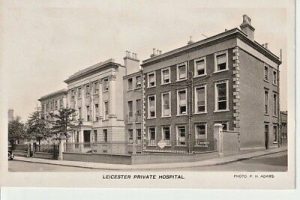
Henry was buried at Gilroes Cemetery and Crematorium, Groby Road, Leicester, Leicestershire, LE3 9QG.
In the October 1976 issue of Newsflash Badmaster (aka GH Diggle) wrote :
“… we well remember his giving a “simultaneous” at the Lincoln Chess Club in 1924, winning 17 and drawing two. One of his more elderly opponents (a notorious non-resigner) who for 30 moves had been wobbling along with a piece down until “time” had to be called, then proceeded to “demonstrate a draw” by concocting a continuation so optimistic that even clubmates with lifelong experience of his powers stood aghast. Atkins, with his greatcoat on ready to go home, made no attempt to refute this analytical masterpiece but merely remarked with great deference: “I don’t think we can play it quite like that!” and then beat a craven retreat “escorted by Club Officials”
From British Chess Magazine, Volume LXXV (75, 1955), Number 3 (March), pp.102-3 we have this obituary written by RN Coles :
“With the passing, on January 31st, at the age of eighty-two of Henry Ernest Atkins the chess world has lost a recognized international master, and British chess one of its strongest players of all time. Yet Atkins was the despair of chess enthusiasts because he played so little international chess and confined himself largely – and at that intermittently – to local affairs, where the strength of most of his opponents could hardly extend him. One leading player recently regretted that Atkins spent so much time “in the wilds,” but Atkins would have taken an opposite view and have considered that he was “in the wilds” if he had spent more of his time playing chess; teaching was his whole life, and the game of chess he insisted on treating as a game.
Consequently as a chess-player Atkins was almost always out of practice and playing below his true strength, yet in his five international events-Amsterdam, 1899; Hanover, 1902; London, 1922; London Team Tourney, 1927; and Warsaw Team Tourney, 1935-he scored 63.2 per cent, or if Amsterdam which was virtually a Hauptturnier is excluded, 53.5 per cent.
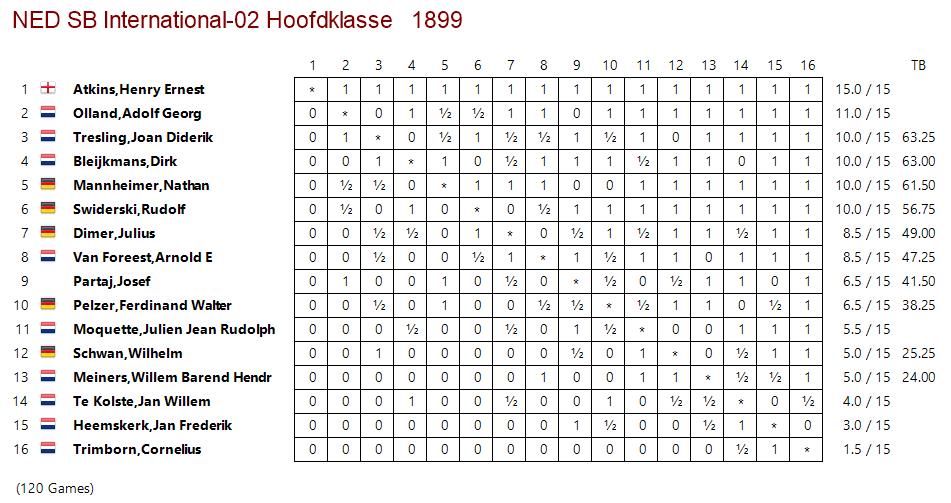
Sir George Thomas considered that only lack of opportunity prevented him from establishing himself in the world championship class. As it is, he will be remembered chiefly by chess-players as the man who played eleven times in the British Championship and won it nine times, failing only at the first attempt in 1904 after a tie for first place, and at the last in 1937, at the age of sixty-five, when he shared third place, a record which has never been remotely approached by any other player and is not likely to be. Atkins played in a clear-cut strategical style which makes his games ideal studies for the beginner, and he finished them with the elegance to enchant the artist; like the Etudes of Chopin, they provide technical exercises and works of art in one.
But I believe that if Atkins had his wish – and this wish I am sure he will have – he would wish to be remembered by his many pupils, whether they be pupils of the chess master or of the schoolmaster, not for any practical achievements but for being a true guide, philosopher, and friend to all who came under his tutelage.-R. N. C.”
From The Oxford Companion to Chess by Hooper & Whyld
English player, born in Leicester, International Master (1950), schoolmaster. Between 1895 and 1901 he played in seven minor tournaments, winning four, taking second place in three, and losing only three out of 70 games. In one of these events, Amsterdam 1899, he made a clean score against 15 opponents. In his first international tournament, Hanover 1902, he came third (+8=7-2) after Janowski and Pillsbury ahead of Mieses, Chigorin, and Marshall. Emanuel Lasker believed that Atkins would have joined the leading grandmasters had he continued his international career, but Atkins played in only one more big tournament (London 1922). He had a genuine concern for his profession, and preferred not to give more of his life to chess. He played in 12 of the Anglo-American cable matches, won the British Championship nine times (1905-11, 1924, 1925), and represented the British Chess Federation in the Olympiads of 1927 and 1935.
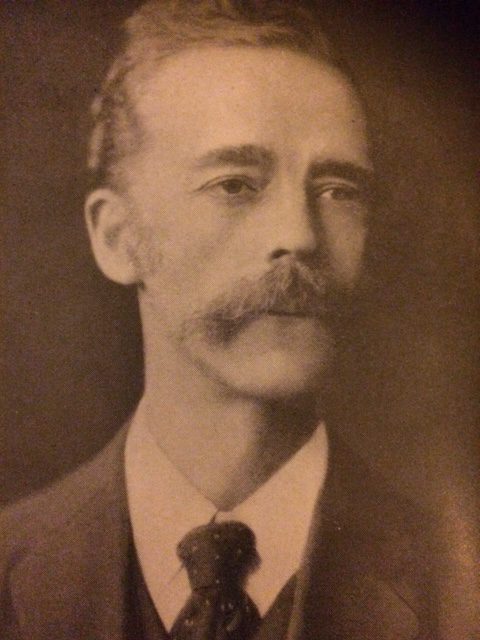
From The Encyclopedia of Chess by Anne Sunnucks :
International Master (1950) and nine times British Champion. Born in Leicester on 20th August 1872, Atkins learned the game at school in Leicester at the age of 12. When he was 15, he joined Leicester Chess Club and within two years was playing on top board. In 1890 he went up to Peterhouse, Cambridge, and played top board for the University. On leaving Cambridge he became a schoolmaster.
His first appearance in the British Championship was in 1904, when he came 2nd. The following year he won the championship and repeated his success every year up to and including 1911. He did not compete between 1912 and 1923, and on reappearing in the event in 1924, he regained his title and held it the following year. His final appearance in the British Championship was in 1937, when at the age of 65 he came =3rd.
In the five international events in which he played – Amsterdam 1899, Hanover 1902, London 1922 and the Chess Olympiads of 1927 and 1935 – he scored over 60 per cent.
His devotion to teaching and his insistence on treating chess as merely a game was all that prevented him from becoming one of the leading players in the world.
He died on 31st January, 1955.
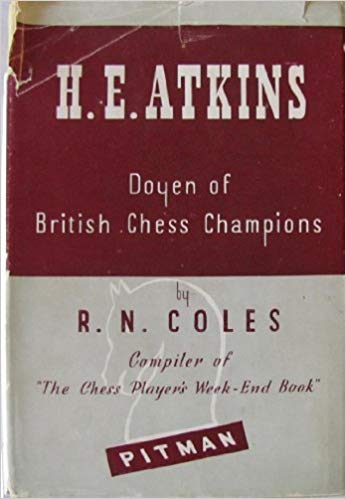
In the above book RN Coles points out that Atkins regularly played f4 or …f5 early in the game and claims this was HEAs pet or signature move.
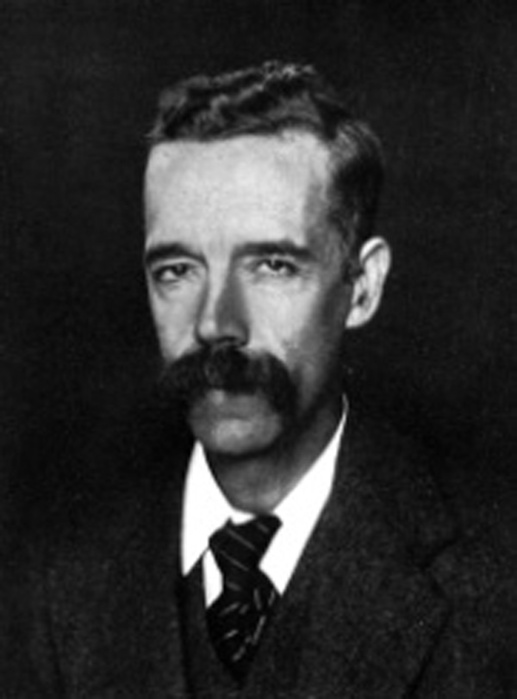
From The Encyclopaedia of Chess by Harry Golombek :
British international master and regarded by many as Britain’s more talented player in the history of the game. Born in Leicester and never very fond of leaving England. Atkins was a schoolmaster and devoted relatively little time to chess, and yet he became one of the strongest amateurs every known to chess. He was known on the Continent as “the little Steinitz“.
His record in British Championship is unique; out of eleven appearances he won the event nine times : 1905, 1906, 1907, 1908, 1909, 1910, 1911, 1924 and 1925. I t should be added that in 1904 (his first attempt) he finished 1st= and only lost to Napier after a play-off and in 1937 (his last championship) he finished =3rd at the age of 65!
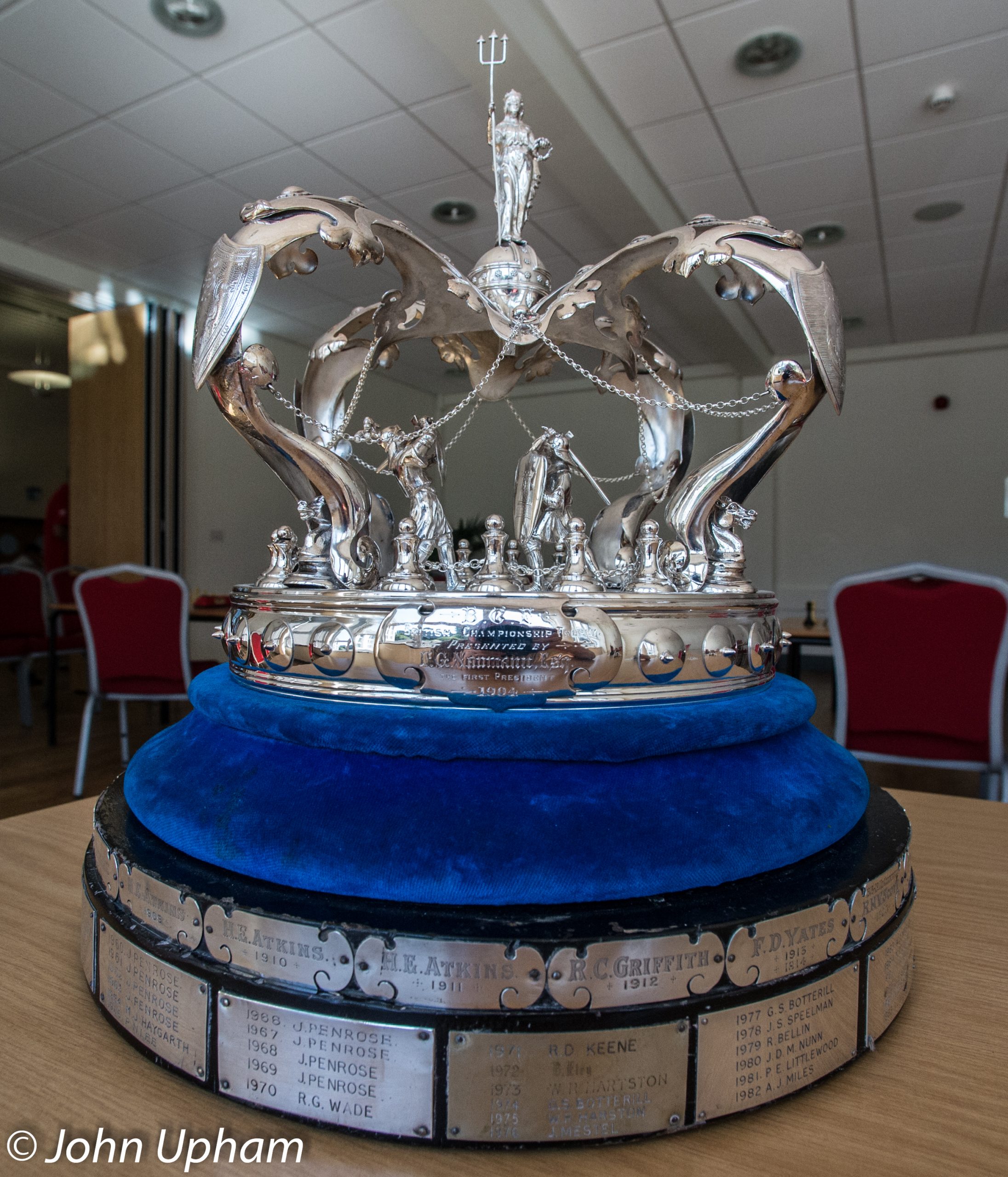
His international career comprises only six events. In 1895 Atkins was placed =2nd behind Maróczy in the Hastings Minor Tournament and in 1899 he won the Amsterdam tournament, leading the field by 4 points. At Hanover 1902 he scored his most notable result : 3rd prize behind Janowski and Pillsbury but ahead of Chigorin and Marshall among others. At London 1922 he finished only 10th of 16 but still claimed Rubinstein and Tartakower among his victims. He represented the B.C.F. in the Olympiads of 1927 and 1935.
Atkins was retrospectively awarded the title of international master in 1950 on his pre-war record. (Ray Keene).
According to chessgames.com : “He graduated from Cambridge and taught mathematics at Northampton and Wyggeston. In 1909, he was appointed Principal of Huddersfield College.”
From The Encyclopaedia of Chess (Robert Hale, 1970 & 1976), Anne Sunnucks :
“International Master (1950) and nine times British Champion.
Born in Leicester on 20th August 1872, Atkins learned the game at school in Leicester at the age of 12. When he was 15, he joined Leicester Chess Club and within two years was playing on top board. In 1890 he went up to Peterhouse, Cambridge, and played on top board for the University. On leaving Cambridge he became a schoolmaster.
His first appearance in the British Championship was in 1904, when he came 2nd. The following year he won the championship and repeated his success every year up to and including 1911. He did not compete between 1912 and 1923, and on reappearing in the event in 1924, he regained his title and held it the following year. His final appearance in the British Championship was in 1937, when at the age of 65 he came =3rd.
In the five international events in which he played – Amsterdam 1899, Hanover 1902, London 1922, and the chess Olympiads of 1927 and 1935 – he scored over 60 per cent.
His devotion to teaching and his insistence on treating chess as merely a game was all that prevented him from becoming one of the leading players in the world.
He died on 31st January, 1955. ”
Here is an article from the Yorkshire Chess History site
and here is an obituary from the MCCU site
Here is his Wikipedia article
and here is an excellent article on chess.com
Recently renowned journalist and write John Saunders has turned his attention to HEA.
We remember Henry Atkins who passed away, Monday, January 31st, 1955.
Henry Ernest Atkins was born in Leicester on Tuesday, August 20th, 1872 to Edward (a schoolteacher) and Jane Atkins (née Threapland).
He was baptised on August 6th, 1872 in the Anglican Cathedral Church of St. Martin, Leicester. At the time of the baptism the Atkins family was living at 57, King Richard’s Road, Leicester. The address in 2021 appears to be occupied by an industrial premise for Sunco Knitwear Specialists. The signatory on the baptism record is that of DJ Vaughan.

Henry was admitted to Wyggeston Boys Grammar School, Leicester on March 30th 1880 when eight years old. He was expected to leave at the end of the Winter Term in 1890.

Curiously his school admission record includes the following addition (although we don’t know exactly when) :

Henry, aged 18, went up to Peterhouse College, Cambridge in 1890 to study mathematics. From his year of entry he was ranked as 9th “Wrangler” studying for the Mathematical Tripos. As part of his Part II examinations he did well enough to be “mentioned” for the Smith’s Prize for examination performance.

(Here is more on Kummer’s Proof of Fermat’s Last Theorem.)
Following University Henry became a teacher of mathematics at Northampton County Modern School and then returned to Wyggeston Boys Grammar School from 1902 – 1908. He then became the principal of Huddersfield College in 1909 and continued until 1915. Huddersfield College (founded in 1839) was merged with Hillhouse Technical School to form a new boys’ grammar school at a new campus at Salendine Nook with 950 boys.
According to Ranneforths Schach-Kalender (cited by C.N.), 1915, page 55, during the period at Huddersfield College Henry lived firstly at 49 New North Road, Huddersfield, Yorkshire :

and then
36 Gledholt Road, Huddersfield, Yorkshire, HD1 4HP :

On June 1st, 1915 (aged 43) Henry was registered as a teacher whilst at Huddersfield College for the fee of one guinea :

Henry retired from teaching in 1936.
In the 1939 register Henry (now a retired schoolmaster) was recorded as living with his wife, Elspeth Skene Atkins (née Wilson) at 29 East Avenue, Leicester, Leicestershire :

Elspeth was born on August 5th 1880 and was therefore roughly eight years his junior. She carried out “unpaid domestic duties” but as a member of the Women’s Voluntary Service (WVS) she was a surgical dresser. The WVS transformed into the RVS. It would seem that Henry and Elspeth did not have children. She outlived Henry passing away in 1973 in Southampton.
On Monday, January 31st 1955 passed away in The Fielding Johnson Private Hospital :


Henry was buried at Gilroes Cemetery and Crematorium, Groby Road, Leicester, Leicestershire, LE3 9QG.
In the October 1976 issue of Newsflash Badmaster (aka GH Diggle) wrote :
“… we well remember his giving a “simultaneous” at the Lincoln Chess Club in 1924, winning 17 and drawing two. One of his more elderly opponents (a notorious non-resigner) who for 30 moves had been wobbling along with a piece down until “time” had to be called, then proceeded to “demonstrate a draw” by concocting a continuation so optimistic that even clubmates with lifelong experience of his powers stood aghast. Atkins, with his greatcoat on ready to go home, made no attempt to refute this analytical masterpiece but merely remarked with great deference: “I don’t think we can play it quite like that!” and then beat a craven retreat “escorted by Club Officials”
From British Chess Magazine, Volume LXXV (75, 1955), Number 3 (March), pp.102-3 we have this obituary written by RN Coles :
“With the passing, on January 31st, at the age of eighty-two of Henry Ernest Atkins the chess world has lost a recognized international master, and British chess one of its strongest players of all time. Yet Atkins was the despair of chess enthusiasts because he played so little international chess and confined himself largely – and at that intermittently – to local affairs, where the strength of most of his opponents could hardly extend him. One leading player recently regretted that Atkins spent so much time “in the wilds,” but Atkins would have taken an opposite view and have considered that he was “in the wilds” if he had spent more of his time playing chess; teaching was his whole life, and the game of chess he insisted on treating as a game.
Consequently as a chess-player Atkins was almost always out of practice and playing below his true strength, yet in his five international events-Amsterdam, 1899; Hanover, 1902; London, 1922; London Team Tourney, 1927; and Warsaw Team Tourney, 1935-he scored 63.2 per cent, or if Amsterdam which was virtually a Hauptturnier is excluded, 53.5 per cent.

Sir George Thomas considered that only lack of opportunity prevented him from establishing himself in the world championship class. As it is, he will be remembered chiefly by chess-players as the man who played eleven times in the British Championship and won it nine times, failing only at the first attempt in 1904 after a tie for first place, and at the last in 1937, at the age of sixty-five, when he shared third place, a record which has never been remotely approached by any other player and is not likely to be. Atkins played in a clear-cut strategical style which makes his games ideal studies for the beginner, and he finished them with the elegance to enchant the artist; like the Etudes of Chopin, they provide technical exercises and works of art in one.
But I believe that if Atkins had his wish – and this wish I am sure he will have – he would wish to be remembered by his many pupils, whether they be pupils of the chess master or of the schoolmaster, not for any practical achievements but for being a true guide, philosopher, and friend to all who came under his tutelage.-R. N. C.”
From The Oxford Companion to Chess by Hooper & Whyld
English player, born in Leicester, International Master (1950), schoolmaster. Between 1895 and 1901 he played in seven minor tournaments, winning four, taking second place in three, and losing only three out of 70 games. In one of these events, Amsterdam 1899, he made a clean score against 15 opponents. In his first international tournament, Hanover 1902, he came third (+8=7-2) after Janowski and Pillsbury ahead of Mieses, Chigorin, and Marshall. Emanuel Lasker believed that Atkins would have joined the leading grandmasters had he continued his international career, but Atkins played in only one more big tournament (London 1922). He had a genuine concern for his profession, and preferred not to give more of his life to chess. He played in 12 of the Anglo-American cable matches, won the British Championship nine times (1905-11, 1924, 1925), and represented the British Chess Federation in the Olympiads of 1927 and 1935.

From The Encyclopedia of Chess by Anne Sunnucks :
International Master (1950) and nine times British Champion. Born in Leicester on 20th August 1872, Atkins learned the game at school in Leicester at the age of 12. When he was 15, he joined Leicester Chess Club and within two years was playing on top board. In 1890 he went up to Peterhouse, Cambridge, and played top board for the University. On leaving Cambridge he became a schoolmaster.
His first appearance in the British Championship was in 1904, when he came 2nd. The following year he won the championship and repeated his success every year up to and including 1911. He did not compete between 1912 and 1923, and on reappearing in the event in 1924, he regained his title and held it the following year. His final appearance in the British Championship was in 1937, when at the age of 65 he came =3rd.
In the five international events in which he played – Amsterdam 1899, Hanover 1902, London 1922 and the Chess Olympiads of 1927 and 1935 – he scored over 60 per cent.
His devotion to teaching and his insistence on treating chess as merely a game was all that prevented him from becoming one of the leading players in the world.
He died on 31st January, 1955.

In the above book RN Coles points out that Atkins regularly played f4 or …f5 early in the game and claims this was HEAs pet or signature move.

From The Encyclopaedia of Chess by Harry Golombek :
British international master and regarded by many as Britain’s more talented player in the history of the game. Born in Leicester and never very fond of leaving England. Atkins was a schoolmaster and devoted relatively little time to chess, and yet he became one of the strongest amateurs every known to chess. He was known on the Continent as “the little Steinitz“.
His record in British Championship is unique; out of eleven appearances he won the event nine times : 1905, 1906, 1907, 1908, 1909, 1910, 1911, 1924 and 1925. I t should be added that in 1904 (his first attempt) he finished 1st= and only lost to Napier after a play-off and in 1937 (his last championship) he finished =3rd at the age of 65!

His international career comprises only six events. In 1895 Atkins was placed =2nd behind Maróczy in the Hastings Minor Tournament and in 1899 he won the Amsterdam tournament, leading the field by 4 points. At Hanover 1902 he scored his most notable result : 3rd prize behind Janowski and Pillsbury but ahead of Chigorin and Marshall among others. At London 1922 he finished only 10th of 16 but still claimed Rubinstein and Tartakower among his victims. He represented the B.C.F. in the Olympiads of 1927 and 1935.
Atkins was retrospectively awarded the title of international master in 1950 on his pre-war record. (Ray Keene).
According to chessgames.com : “He graduated from Cambridge and taught mathematics at Northampton and Wyggeston. In 1909, he was appointed Principal of Huddersfield College.”
From The Encyclopaedia of Chess (Robert Hale, 1970 & 1976), Anne Sunnucks :
“International Master (1950) and nine times British Champion.
Born in Leicester on 20th August 1872, Atkins learned the game at school in Leicester at the age of 12. When he was 15, he joined Leicester Chess Club and within two years was playing on top board. In 1890 he went up to Peterhouse, Cambridge, and played on top board for the University. On leaving Cambridge he became a schoolmaster.
His first appearance in the British Championship was in 1904, when he came 2nd. The following year he won the championship and repeated his success every year up to and including 1911. He did not compete between 1912 and 1923, and on reappearing in the event in 1924, he regained his title and held it the following year. His final appearance in the British Championship was in 1937, when at the age of 65 he came =3rd.
In the five international events in which he played – Amsterdam 1899, Hanover 1902, London 1922, and the chess Olympiads of 1927 and 1935 – he scored over 60 per cent.
His devotion to teaching and his insistence on treating chess as merely a game was all that prevented him from becoming one of the leading players in the world.
He died on 31st January, 1955. ”
Here is an article from the Yorkshire Chess History site
and here is an obituary from the MCCU site
Here is his Wikipedia article
and here is an excellent article on chess.com
Recently renowned journalist and write John Saunders has turned his attention to HEA.
We remember Hugh Alexander who passed away on Friday, 15-ii-1974. The death was registered in the Borough of Cheltenham. Currently his burial / cremation site is unknown.
Conel Hugh O’Donel Alexander was born on Monday, April 19th, 1909 in Cork, Munster, Republic of Ireland.

Hugh’s parents were Conel William Long Alexander (1879-1920) and Hilda Barbara Alexander (née Bennett) (1881-1964) who married in Hook Church, Hampshire. His father was a Professor of Civil Engineering from County Donegal and his mother was the daughter of a timber merchant and was from Birmingham.
Hugh’s father moved to Hook in Hampshire. At some point they returned to Cork and then relocated to Birmingham.
In the 1911 Irish census aged two Hugh was recorded as being a Presbyterian. The household consisted of his father, mother and two servants Maud McAuliffe (19) from County Cork and Johanna Hanlon (20) from Cork City all living at 20, Connaught Avenue, Cork.
At the time of the census all members of the household were capable of reading and writing apart from Hugh who was recorded as “cannot read”.
and Hugh’s father signed the Return as follows :

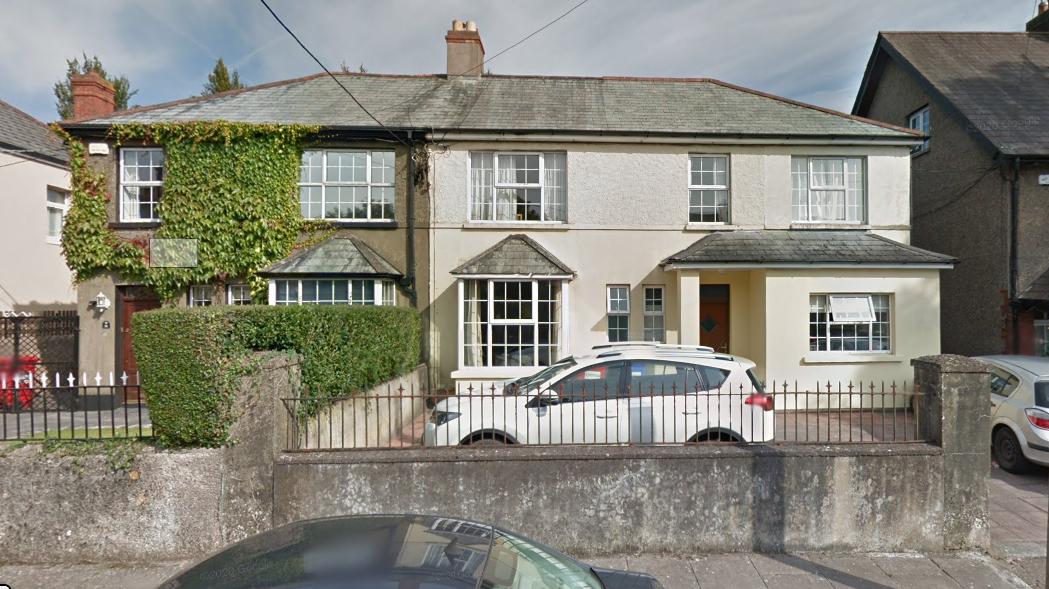
Hugh attended Londonderry College and then went to King Edward’s School, Birmingham.
Hugh married Enid Constance Rose Crichton Neate (1900-1982) in October 1934 and the marriage was registered in the district of Westminster, Middlesex.
According to Rodric Braithwaite :
“Enid, was an equally striking personality. She was descended from one of the defenders of the Eureka Stockade, the “birthplace of Australian democracy”. She was educated at the Sorbonne, a formidable dialectician, art historian and collector. In her later years she returned to Australia, where she was endlessly hospitable to passing Russian chessplayers, and to itinerant musicians, including my own father.”
Hugh and Enid had a son Michael (19 June 1936 – 1 June 2002) who became the foreign policy secretary to Margaret Thatcher and the UK ambassador to NATO. Here is Michael’s obituary.
Michael married Traute Krohn. Michael and Traute gave Hugh a grandson, Conel Alexander who is a Cosmochemist at the Earth and Planets Laboratory, Carnegie Institution for Science, Washington.

Prior to the second world war Alexander was officially employed by John Spedan Lewis in his Department store in Oxford Street. When he returned from Buenos Aires (“good air”) from the 1939 Olympiad he travelled aboard the RMS Alcantara. Here is the entry in the passenger list for September 19th, 1939 :
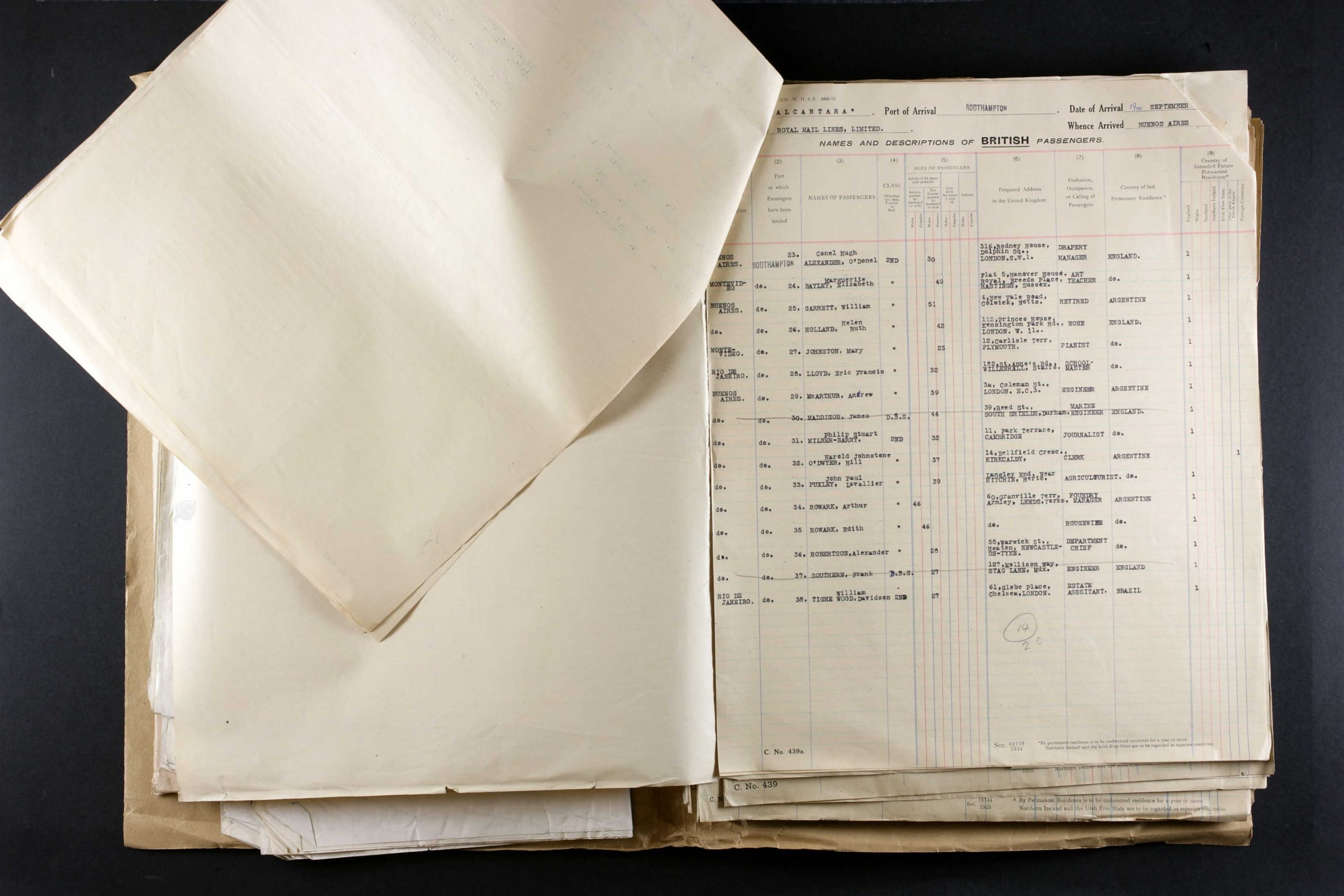
and here is Alexander’s entry in detail. Note that his occupation is described as “Drapery Manager” :

Hugh sailed from Buenos Aires, Argentina in September 1939 to arrive at Southampton September 19th 1939. The ship was the Alcantara operated by Royal Mail Lines Ltd hence the RMS Alcantara.
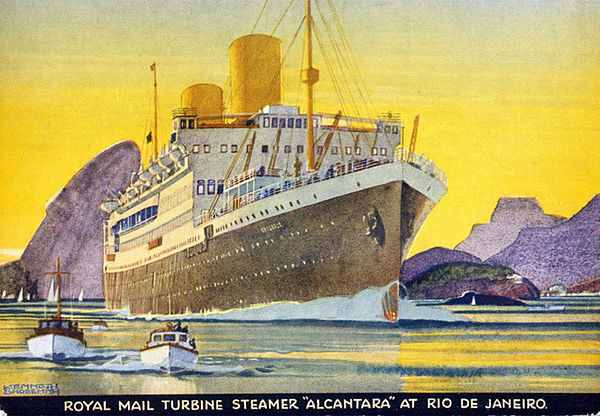
According to Wikipedia : “RMS Alcantara was a Royal Mail Lines ocean liner that was built in Belfast in 1926. She served in the Second World War first as an armed merchant cruiser and then a troop ship, was returned to civilian service in 1948 and scrapped in 1958.
Ports of the voyage were : Buenos Aires; Montevideo; Santos and Rio de Janeiro and Hugh’s official number was 148151 and he travelled 2nd class. His proposed destination residential address was
316, Rodney House, Dolphin Square, London, SW1
According to Wikipedia : “The proximity of Dolphin Square to the Palace of Westminster and the headquarters of the intelligence agencies MI5 (Thames House) and MI6 (Vauxhall Cross) has attracted many politicians, peers, civil servants and intelligence agency personnel as residents.”
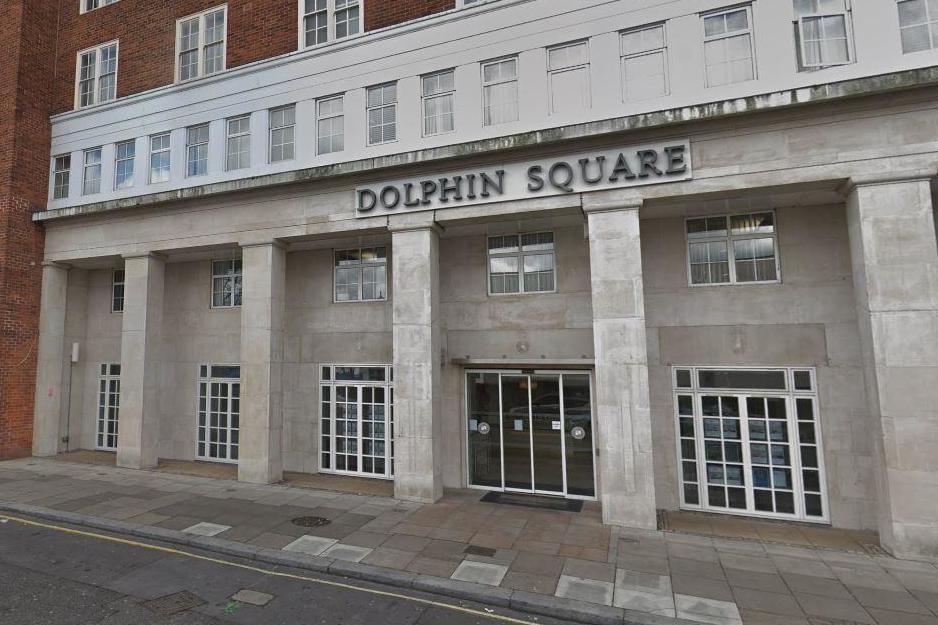
There was some discussion of Drapery Manager in another place.
From British Chess Magazine, Volume XCIV (94, 1974), Number 4 (April), pp. 117-120 by PS Milner-Barry :
“A proper assessment of Hugh Alexander, who died on February 15th 1974 must await a later issue. But I think he might have been pleased to see our last game published, and I give the score of it below, with notes based on our usual analysis immediately after the game. Over the past 45 years, ever since he went to Cambridge, we played whenever opportunity offered serious games with clocks.
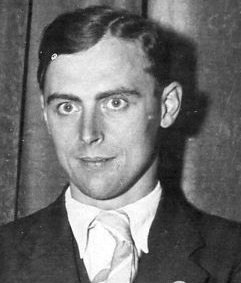
Before the war they were played mostly at my mother’s house in Cambridge, and after the war and my own marriage at our house in Blackheath. When he moved to Cheltenham the opportunities became fewer but no year ever passed without two or three such games, usually at Easter or Christmas.
Alexander always used to say, it was certainly true of me, that this was the kind of chess that he enjoyed most. The games were conducted with the utmost vigour, though not without a good deal of propaganda on both sides. I suppose he won in the proportion of about two to one, but the disparity in strength never became one-sided. Nearly all the games opened 1 P-K4, P-K4; he played the Lopez when I allowed him. (I usually played the Petroff or Philidor), and I played a mixture – in the early days the Vienna and latterly mostly the King’s Gambit. On the whole Black did better than White for both of us.
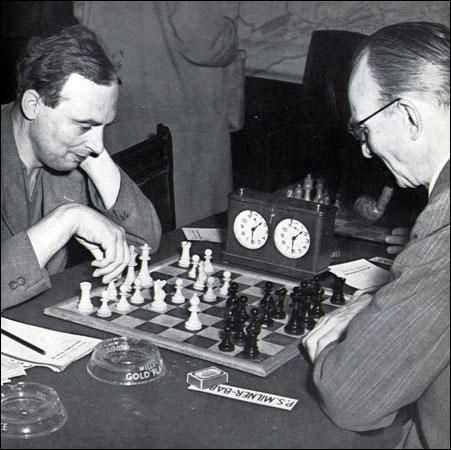
The only concession we made to advancing years was that latterly we contented ourselves with four hour sessions and 36 moves, instead of 40 in 5 hours. We thought we had done enough for honour by then, and the games were usually finished in the time.
Hugh stayed with us the weekend before Christmas, when this game was played. He looked ill, but he was very cheerful and as good company as ever. He loved a good argument, and as my family so too,- the evening meal was its usual lively affair! I am myself a man of peace, and intellectually lazy; so in deference to my feelings the argument was suspended, before it became too hot. I am afraid they all thought I was a spoil-sport. It was as happy a visit as any of us could remember and it is difficult to accept there will not be another.
As for the game, it was not one of our most exciting encounters. But it is quite an interesting one, and shows Hugh playing as
well as ever – certainly much too well for me. But then he usually did.”
Following PSMBs contribution, in the same obituary there was this from Harry Golombek :
I have written elsewhere about Hugh Alexander both as a person and as a chess-player and I also intend to devote a forthcoming article in ‘The Times‘ on Saturday to an appraisal of his place in British Chess. Here, however, I would like to describe briefly his connection with this magazine over the years and to show how
important his help was to the progress of the ‘BCM‘.
In the years immediately preceding the Second World War, Ash Wheatcroft and I had made a determined effort to maintain and increase the role of the ‘BCM‘, he in a managerial capacity and I as its editor. With the coming of war and the departure of both of us into the army a sort of caretaker regime had to be provided. It worked as well as could have been expected but inevitably there had been a decline both in quality and financially. When peace came, the quality improved since it was possible to get more and better contributions but the financial aspect became almost alarming.
The question arose – was there a need for the magazine and if so how could that need be fulfilled with the fairly limited resources at hand. Some of us thought there was, but the ways and means were not so clear. Of all those who thought like this Alexander was the most effective in his approach to the problems. I know that from his very youth onwards he had been convinced of the importance of the ‘BCM’ to British chess and, being a practical idealist, when the
crisis came he set about dealing with it in the most expeditious way.
In November 1946 he became a director of the B.C.M. and continued in that position till February 1952, by which time the magazine had been set on a solid basis from
which it was unlikely to be shaken. It was his idea that Brian Reilly be asked to act as editor and almost his first act as director was to write a letter to him inviting him to become so. Then, in January 1947, he himself took over the editorship of the games department, an arduous task which he fulfilled with great competence and the utmost conscientiousness until May 1949 when the heavy work of the Civil Service department of which he was head compelled him to hand over the Games Section to me.
Before, however, that he gave up this post he, again in the most practical way possible, rendered the ‘BCM‘ another service. He wrote a book giving a selection of the games from the last period of Alekhine’s life and generously donated half the royalties to the ‘BCM‘ in order to bolster up its slender finances.
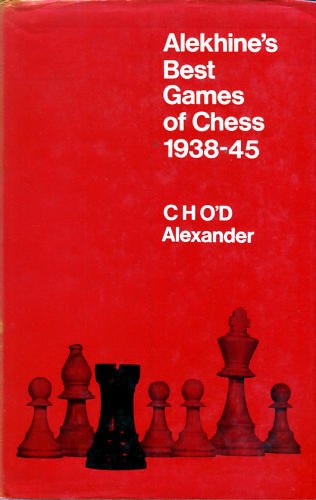
Even after he had to give up official connection with the magazine he retained a strong interest in its welfare. So, even though this recognition is belated and posthumous, I thought it was right to afford readers the possibility of joining with me in thanking High Alexander for all that he did in this respect in especial. At any rate, such matters should be on record for the chess historian.
From The Anglo-Soviet Radio Chess Match by E.Klein and W.Winter :
“CHO’D Alexander was born in Cork in 1909 and learned chess at the age of ten. He was educated at King Edward School, Birmingham, where he exhibited early prowess by winning the Birmingham Post Cup. In 1927 he won the British Boy’s Championship. During his student days, from 1928 to 1932, he was a convincing champion of Cambridge University. Subsequently he competed in five British Championships, winning the title in 1938. He also played in several international tournaments, his outstanding performance amongst these being Hastings in 1938, where he shared second and third prizes with Keres, following Reshevsky who won the tournament, and ahead of Fine and Flohr. In 1939, in the England-Holland match, he had the satisfaction of defeating the ex-World Champion, Dr. Euwe, in a sensational games, drawing the return game.
A brilliant mathematician, he took a first at Cambridge and chose a scholastic career, joining a well-known public school (Winchester College). From there, via a short spell in a business appointment (John Lewis), he entered the service of the Foreign Office, where, during the war years, his valuable work earned him the OBE.
He plays imaginative and courageous chess and is never afraid of the wildest complications.”

From British Chess Magazine, Volume XCIV (94, 1974), Number 6 (June), pp. 202-204 by PS Milner-Barry :
With the death of Hugh Alexander at the age of 64, British chess has lost the outstanding figure of the past forty years. His active playing career over some thirty years included two victories in the British championship and regular appearances in all representative teams from l93l-58, except when the nature of his Civil Service
duties prevented him from travelling behind the Iron Curtain. During the whole of the period after the war he was the regular top board for the England team. In the Hastings international congress he twice won the Premier tournament, on the second occasion tying with Bronstein. His victories in this series included two world champions (Euwe and Botvinnik) and numerous others in the Grandmaster class. He was an outstanding example, like H.E.Atkins and Dr. Milan Vidmar, of the amateur who could combine an exacting professional life of great responsibility and distinction with success in competitive international chess at the highest level and with the increasing professionalism of the game and the demands of knowledge and research that it makes upon the masters, this was much more difficult in Hugh’s time than in an earlier age.
It was indeed in the international field that his fame will principally rest. On the British championship scene, although he always did well before the War, and won convincingly at Brighton in 1938 in a strong field, his record did not match his abilities. He never established anything like the superiority over his contemporaries that Atkins in a former age and Penrose in a later achieved. He won the championship again, in 1956, but that was a weak year when the Moscow Olympiad took first claim on the leading British players. It was not that he cared less – like all the great players he hated losing, though he was the most magnanimous of opponents – but that he seemed to require the stimulus of the great occasion, and of a world famous name on the other side of the board, to bring out the best in him.
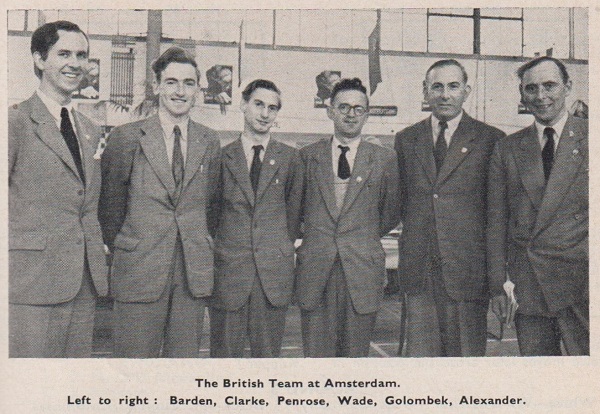
Alexander was perhaps the only English player of his day whom the Grandmasters would have treated as on a level with themselves. On his day he was liable to beat any of them, and they were well aware of it. In his younger days he was very much the gay cavalier, and a brilliant combinative and attacking player with a touch of genius. Latterly he lost some of this elan, and adapted his style to the responsibilities of the B.C.T. top board. His opponents too, with a healthy respect for his powers, were less inclined to give him opportunities. He was as capable of the dead-bat technique as anybody, and to that extent (to my way of thinking anyway) his games became less interesting, with quick draws making a higher contribution to his top-board results than in earlier years. But none the less he was the anchor-man of the British team until his retirement after the 1958 Olympiad.
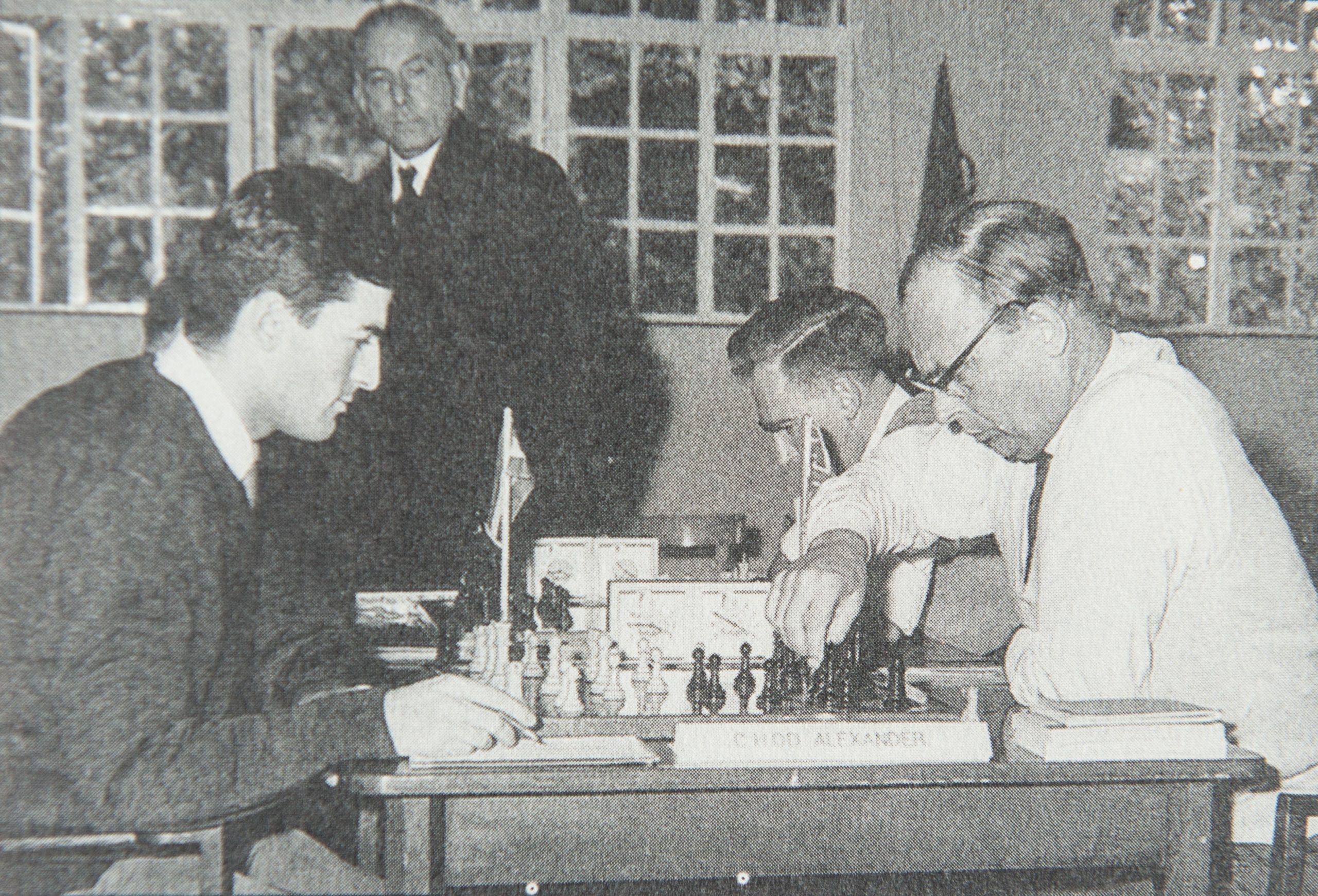
It was a great pity he gave up the game over the board at 50. He had years of good chess in him. But I think he felt he had scaled all the peaks he could scale, and that he was finding top-class competitive chess a burden difficult to reconcile with his Civil Service work and the prospect of a gradual and inevitable decline in his powers did not appeal to him. I made many efforts to tempt him back to the arena, but to no avail. I do not think he ever seriously regretted his decision, and in his last years he immensely enjoyed correspondence chess.
In 1964, Alexander became non-playing captain of the B.C.F. team, and held that role continuously until after the Siegen Olympiad in 1970.
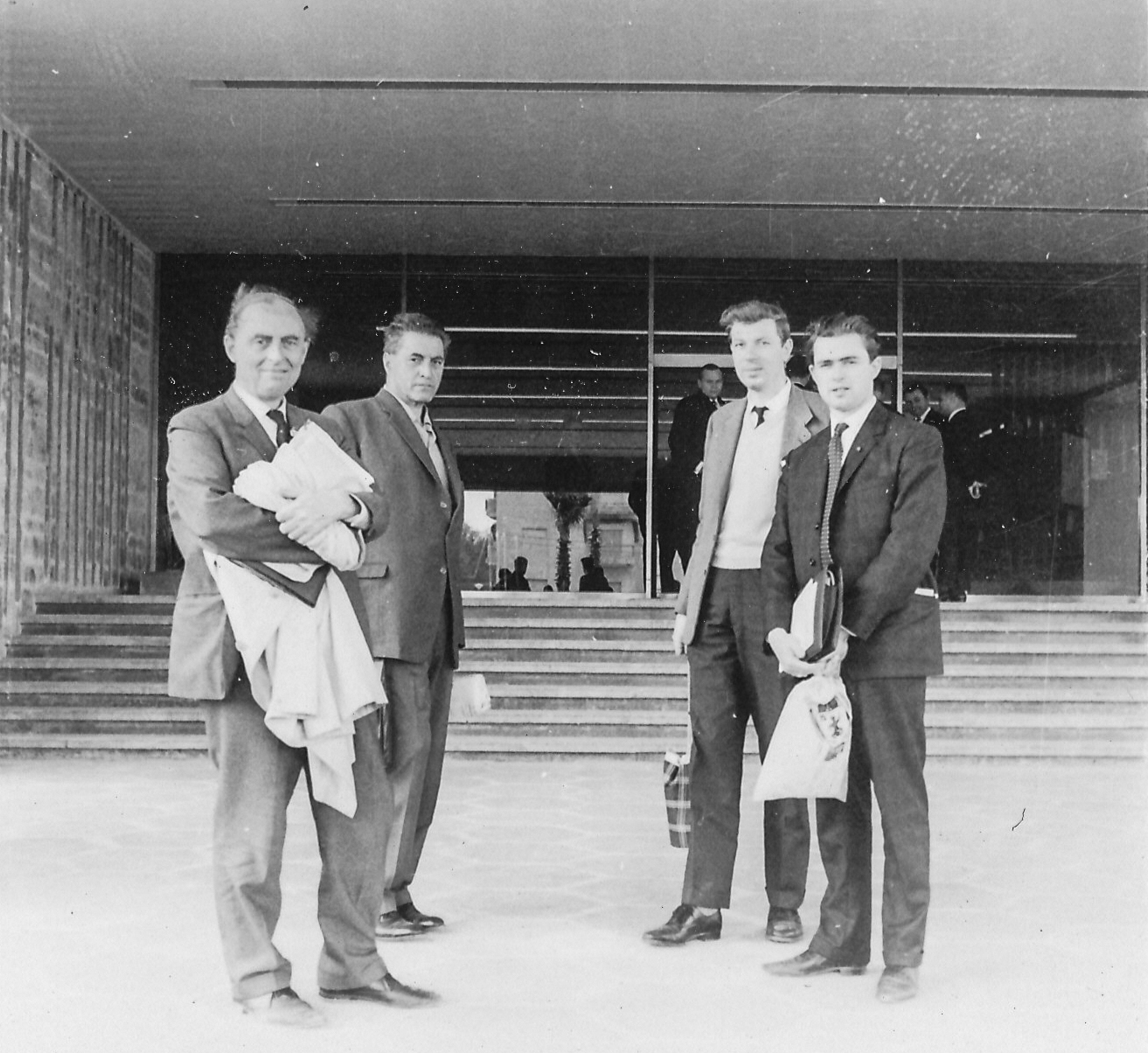
It was rather a disappointing period for British chess, and the results, while we were rebuilding a young team, could not – even with Penrose’s outstanding efforts at top board – have been expected to be favourable. But he threw himself wholeheartedly into all the work sponsored by the B.C.F. and the Friends of Chess to find and develop talent in the younger generation, and before he died the fruits of these labours were beginning to appear. He would have been proud indeed to have witnessed our recent triumph in the Anglo-German match.
As a captain he was, of course, immensely liked and respected by his team. My impression was that he took his responsibilities almost too seriously, and agonised too
much over his decisions about whom to play and whom to rest. Nevertheless on balance he thoroughly enjoyed the work, and certainly, in spite of his innate modesty, he
was never one to be disturbed by ill-informed or irresponsible criticism, of which he had his share.
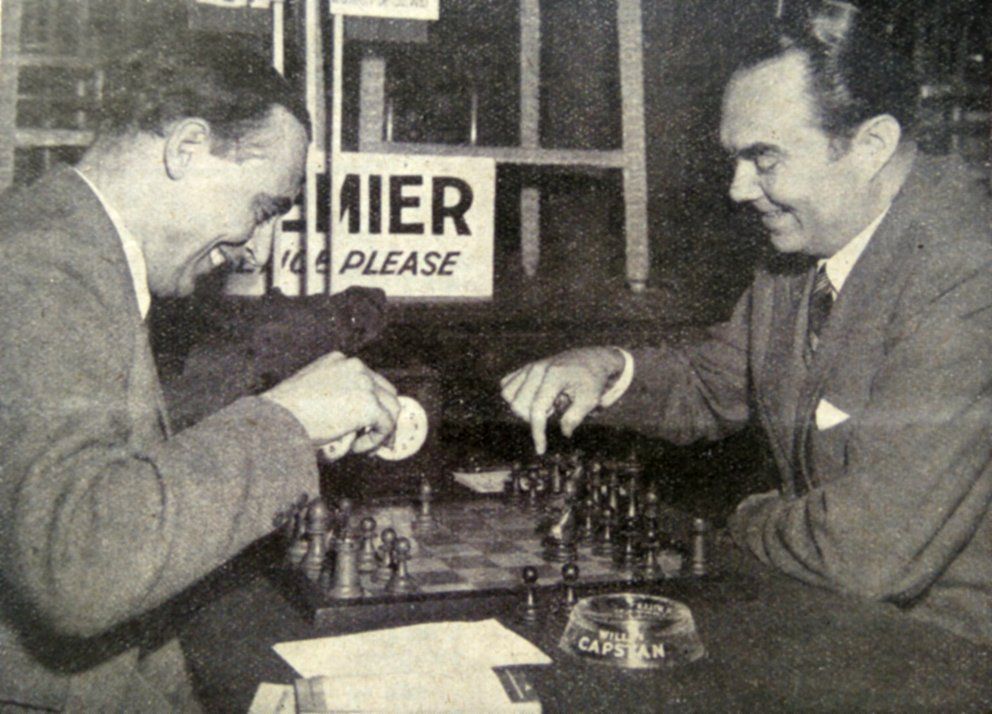
I suppose his most famous tournament result was his equal first with Bronstein at the Hastings Christmas Congress of 1953. Coming at a time when we were gloomily resigned to British players bringing up the rear in international tournaments, this created a great sensation.
The game with Bronstein lasted over 100 moves and Alexander won a most difficult Queen and Pawn ending by impeccable technique.

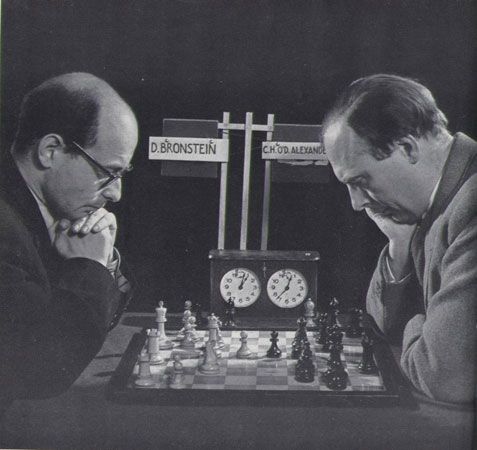
He went on with the Black pieces to massacre Tolush, the other visiting Russian Grandmaster.
Immense interest was created by this event. The popular press carried diagrams of the successive phases of the Bronstein saga. It was reported on the radio. By comparison with the furore created by the Spassky/Fischer match, it was no doubt small beer, but for those days the publicity was tremendous, and Alexander became the
hero of the hour.
It was entirely characteristic of him that this adulation did not go to his head. He kept everything in proportion, and encouraged everybody else to do the same. He said all the right things about Bronstein, but he did not claim, as one tends to do on these emotional occasions, that international sport was a panacea for friendship between the nations. Altogether it seemed to me an impeccable performance both on and off the board.
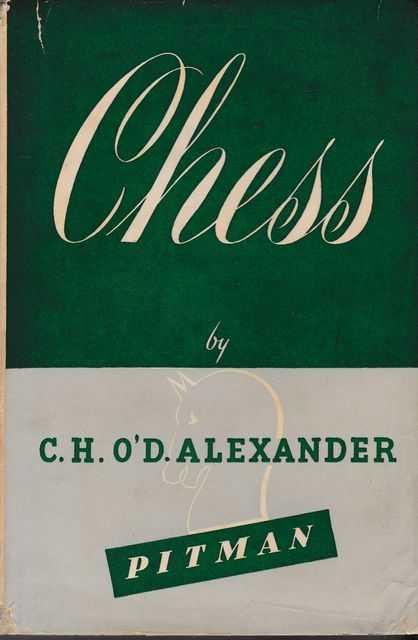
It is as a player that Hugh would, I think, have best wished to be remembered; and I have left myself little room to say anything about him as a journalist and writer. We are blessed, as readers of the B.C.M. will know, with many good and interesting writers on the game. But Hugh had, I believe, exceptional talents as a journalist. In his columns in the ‘Sunday Times‘, and latterly the ‘Financial Times‘, he set a very high standard. He always had something fresh and original to say, especially, I think, to the intelligent amateur rather than the expert; and he said it in a way that was both disarmingly modest and yet lively and entertaining. The warmth of his personality came out clearly both in his writing and in his public speaking – both were entirely natural and wholly without amour-propre.
His articles gave great pleasure to a wide circle, and many who never met him in the flesh must have felt that they had come to know him as a person. Similarly his book on the Spassky-Fischer match
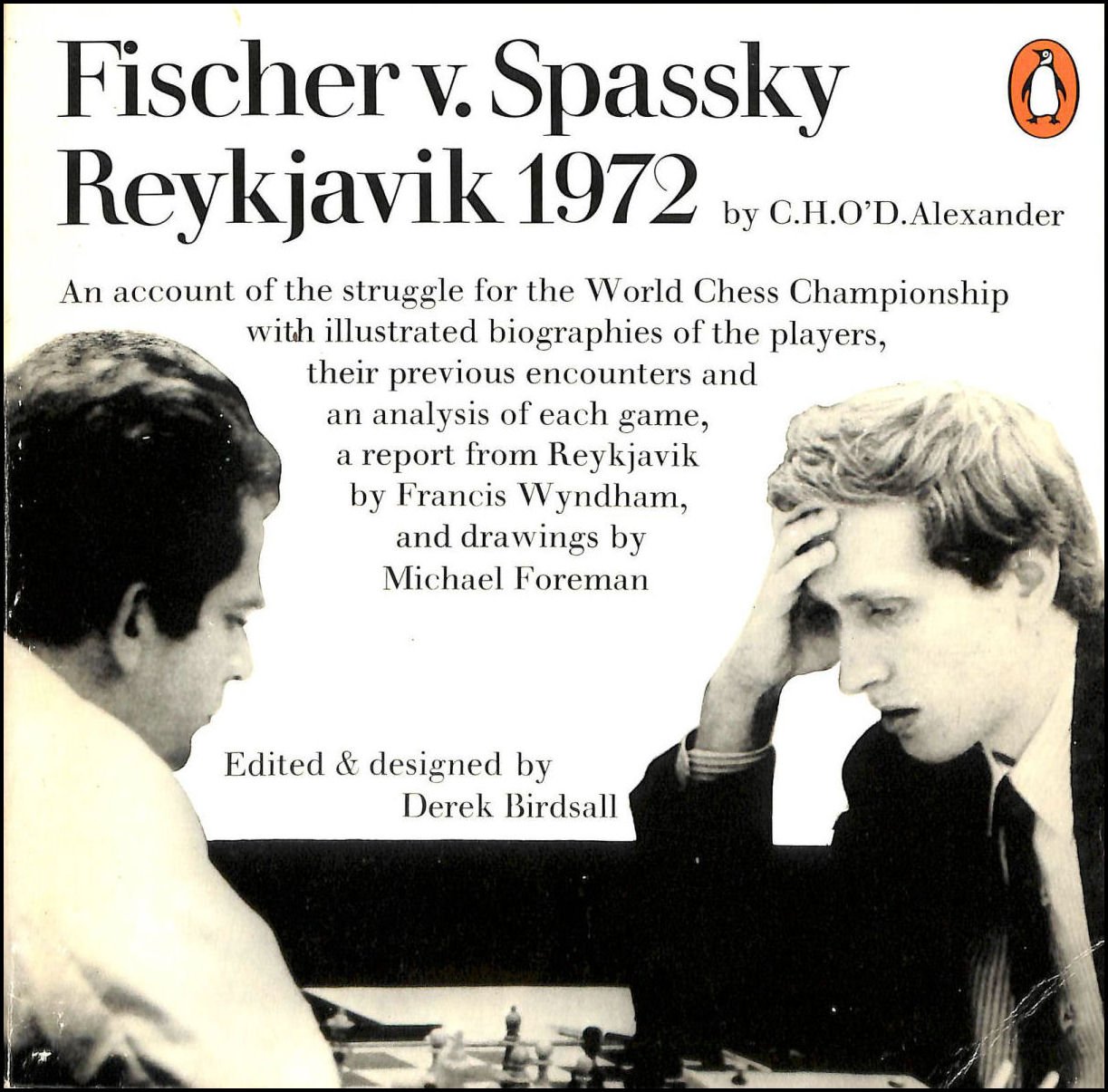
(like the ‘Book of Chess’, which was written in the last year of his life) is an extremely vivid, as well as scholarly, piece of writing. It is almost impossible to believe that it was completed, within days of the conclusion of the match, by a man apparently under sentence of death throughout its progress.
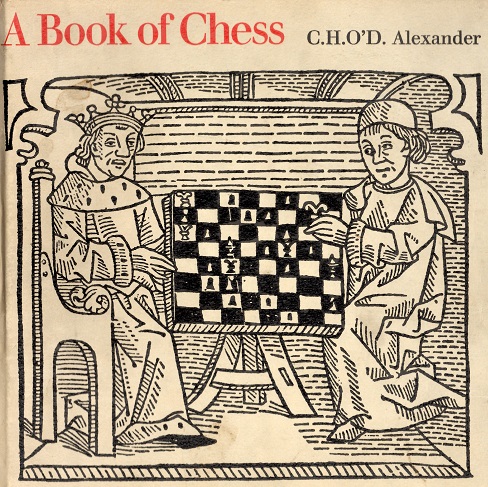
Now that it has come, the loss of Hugh Alexander to British chess and chessplayers, alike as player, writer, administrator and friend, is immeasurable.
From CHESS, Volume 39 (1974), Nos. 693-94, March, p.162 by BH Wood :
The death of Conel Hugh O’Donel Alexander deprived English chess of one of its most vivid characters. Born l9th April 1909, he learnt chess at the age of 8.
From a Londonderry college he went to King Edward’s School, Birmingham, where as a schoolboy he won the Birmingham Post cup, which carries with it the unofficial championship of Staffordshire, Warwickshire and Worcestershire. Going on to Cambridge, he not only won the University championship four years in succession, but picked up first-class honours. He won the British championship in 1938.
In 1939 I found myself on a boat with him bound for the Chess Olympiad in Buenos
Aires. He was team captain with Sir George Thomas, P. S. Milner-Barry and H. Golombek
other distinguished members of the team.
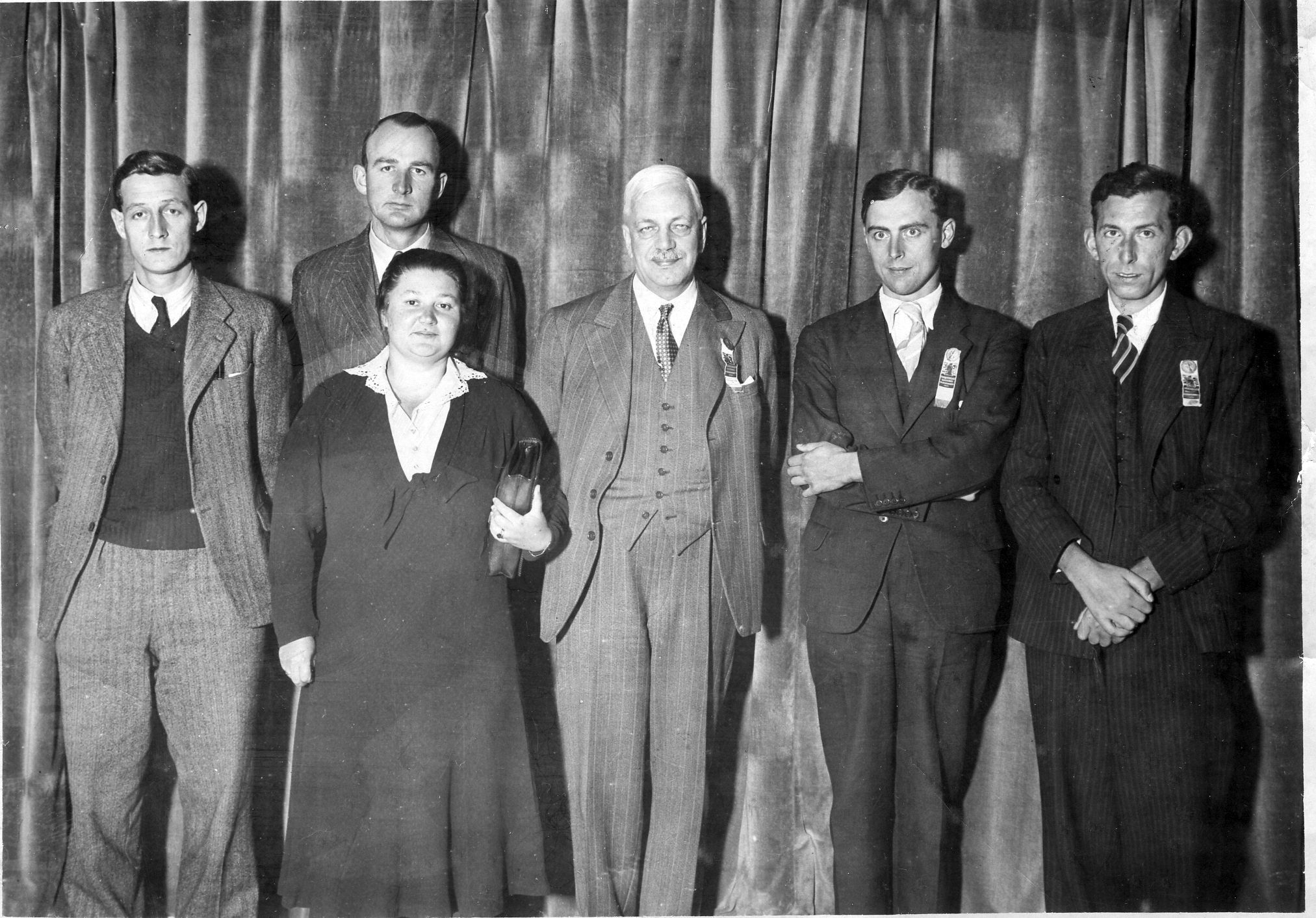
War broke out after about six rounds. With typical determination, Alexander jettisoned chess for patriotism, caught a boat home, volunteered for service on disembarking, and within a few weeks had attained the rank of colonel in British Intelligence. He remained attached to Intelligence and the Foreign Office until his
retirement a few months ago. As a curious consequence of this commitment, though he settled in to the team captaincy for the British Chess Federation in the biennial chess Olympiads and participated in many chess events abroad, he was never allowed to travel anywhere behind the iron Curtain.
His fame certainly did, however. In the radio match, Britain v USSR in 1946, the most important event in British chess for a decade before and after, he found himself pitted against Mikhail Botvinnik, then at the height of his powers and destined to hold the world championship for 14 years. The first game he lost; the second he won, in superb style. His great adversary was outplayed.
He had some great years at Hastings. A 120 move victory over Bronstein with a queen and pawns endgame stretching over l3 hours through 3 days, earned headlines in the national press unequalled until the Spassky-Fischer furore of 1972, won him first place in 1954 and started him with a chess column in the Sunday Times. He was equal with Bronstein, above O’Kelly, Matanovic, Olafsson, Teschner, Tolush, Tartakover, Wade and Horne.
Hastings illustrated Alexander’s weaknesses as well as his strengths. Twice he won the premier tournament there, only to finish among the tail-enders the year after. Only once more was he to win the British champ- ionship; in a rather weak field, entering at the last minute with typical opportunism.
He was a brilliant conversationalist and speaker, a fine bridge player, a master mathematician, an expert on codes, a first-class journalist and writer. Among varied other interests were croquet and philately. He threw himself wholeheartedly into anything he did. His organization, “The Friends of Chess”, provided generous financial support for a wide range of chess events. A few days before his death he was full of plans for the future, including a big History of British Chess. He burnt himself out. The world of chess is a poorer and duller place without him.”
From Chessgames.com :
“Conel Hugh O’Donel Alexander was born in Cork, Ireland. Awarded the IM title in 1950 at its inception and the IMC title in 1970, he was British Champion in 1938 and 1956.
During the Second World War, he worked at Bletchley Park with Harry Golombek and Sir Philip Stuart Milner-Barry, deciphering German Enigma codes and later for the Foreign Office. Alexander finished 2nd= at Hastings (1937/38) tied with Paul Keres after Samuel Reshevsky and ahead of Salomon Flohr and Reuben Fine. He held Mikhail Botvinnik to an equal score (+1, -1) in the 1946 Anglo-Soviet Radio Match, and won Hastings (1946/47) while finishing equal first at Hastings (1953/54). He represented England on six Olympiad teams. Alexander was also an author of note. He passed away in Cheltenham in 1974.”
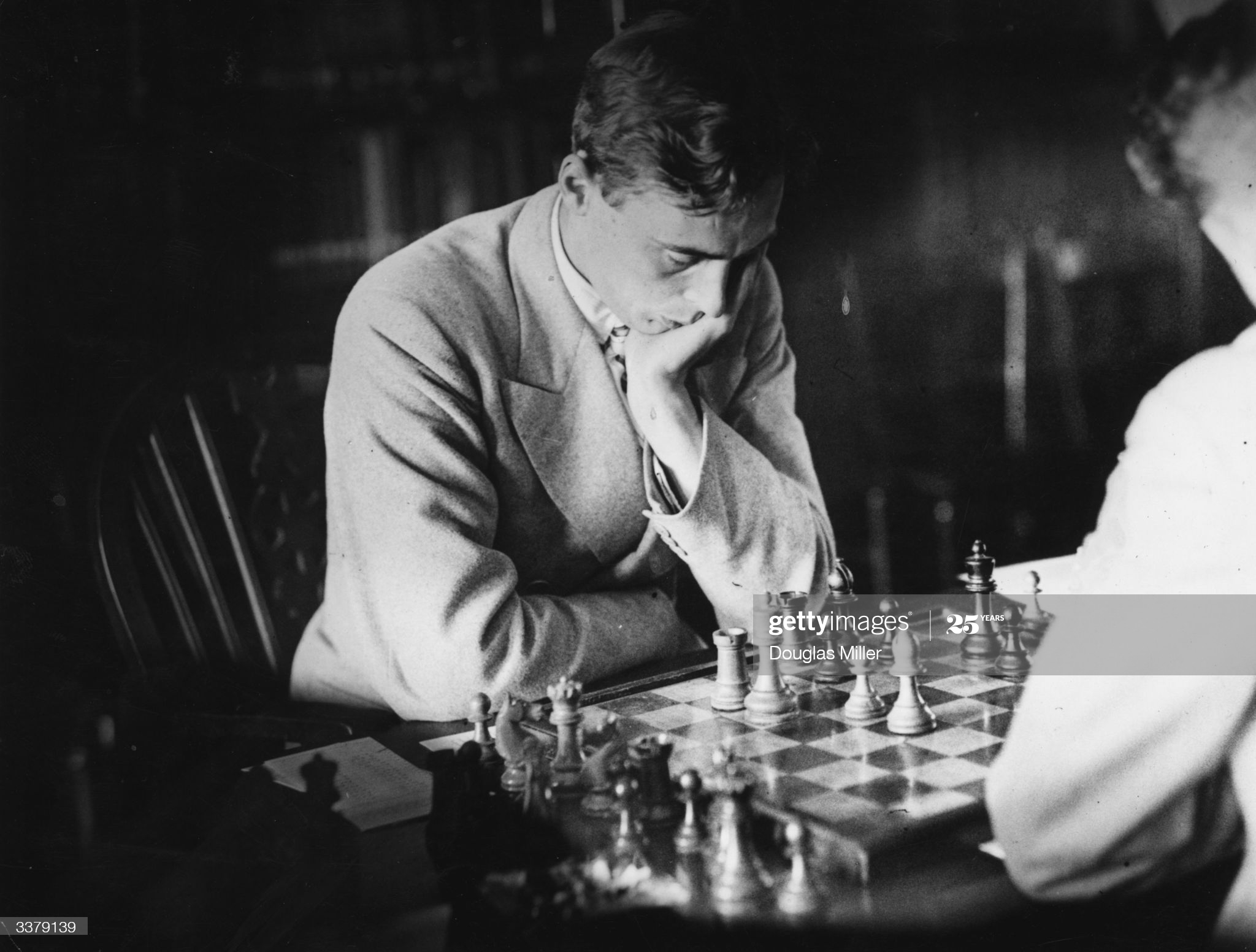
From The Oxford Companion to Chess by Hooper & Whyld :
International Master (1950), International Correspondence Chess Master (1970). Born in Cork, he settled in England as a boy. In spite or because of his intense application at the board his tournament performances were erratic. From about 1937 to the mid 1950s he was regarded as the strongest player in Great Britain, although he won only two (1938, 1956) of the 13 British Chess Federation Championships in which he competed; he played for the BCF in six Olympiads from 1933 to 1958. Holding a senior post at the Foreign Office, he was not permitted to play in countries under Soviet control or influence; but when he did compete abroad he achieved only moderate results. His best tournament achievement was at Hastings 1937-8 when he was second (+4=5) equal with Keres after Reshevsky ahead of Fine and Flohr; but he is better remembered for his tie with Bronstein for first prize at Hastings 1953-4. He won his game against Bronstein in 120 moves after several adjournments, and the outcome became a kind of serial in the press, arousing great national interest in the game. Alexander was the author of several books on chess, notably Alekhine’s Best Games of Chess 1938-1945 (1949) and A Book of Chess (1973).
From The Encyclopaedia of Chess by Anne Sunnucks :
For many years the chess correspondent of The Sunday Times, The Spectator (pseudonym Philidor) and the Evening News. There was probably no “chess name that was better known to the non-chess-playing element of the British public than that of Hugh Alexander. His victory over Russian Grandmaster David Bronstein at Hastings in 1953, after a struggle which lasted for 120 moves and took 13 hours, made chess front page news in the British press.
Born in Cork on 19th April 1909, Alexander picked up the game at prep school at the age of 8. In 1926 he won the Boy’s Championship, later to be recognised as the British Boy’s Championship, at Hastings. After coming down from Cambridge University, where he won the university championship four times, Alexander taught mathematics at Winchester College from 1932 to 1938. He later joined the Foreign Office.
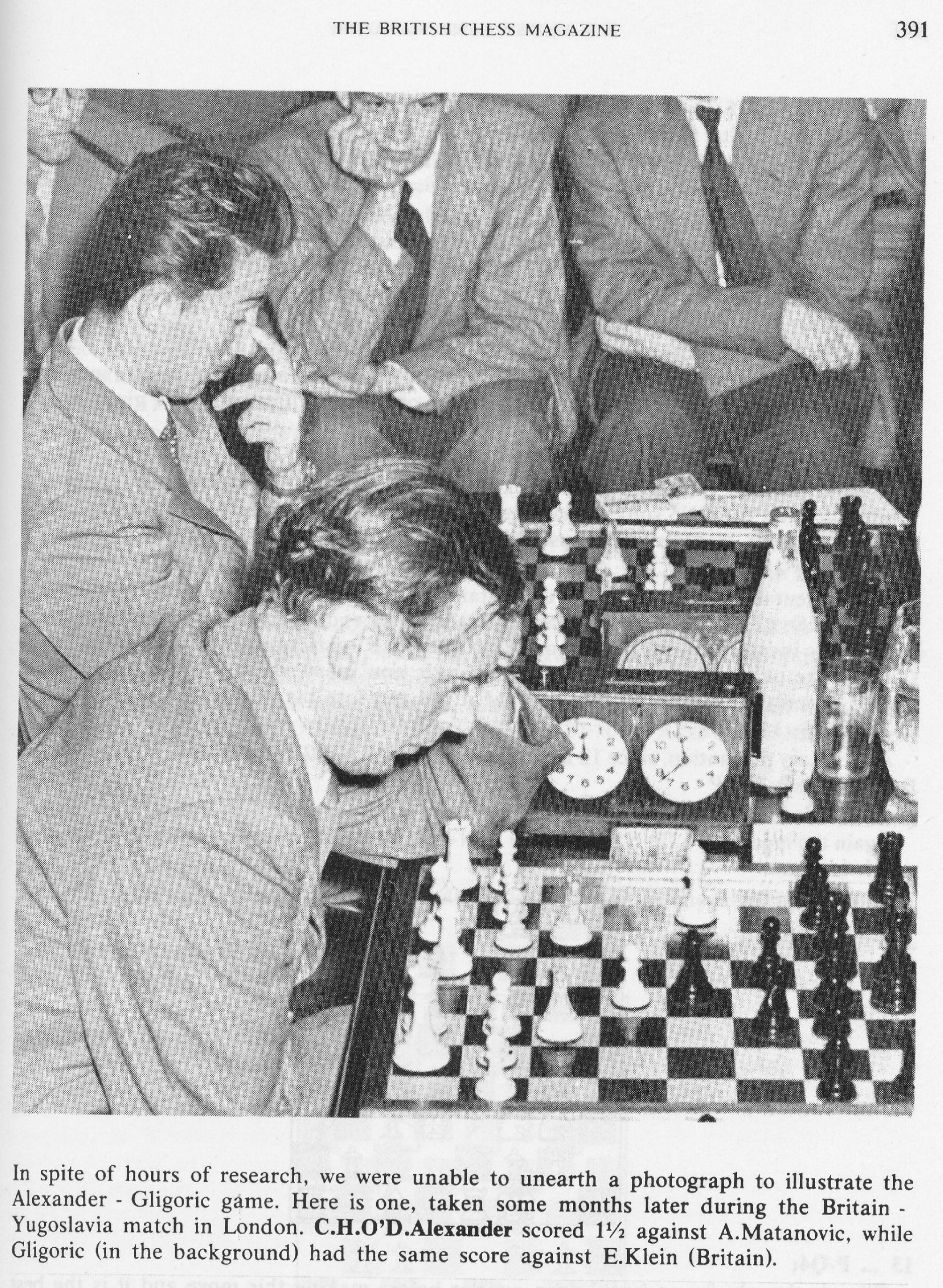
One of the few British players who might have reached World Championship class if he had chosen to devote sufficient time to the game, Alexander was at his best when he faced a top class opponent.
During his chess career, he scored victories over two World Champions Botvinnik and Euwe, and he beat a number of other Grandmasters, international tournaments were all at Hastings where he came =2nd in 1938 with Keres, half a point behind Reshevsky and ahead of Fine and Flohr; 1st in 1947 and =1st with Bronstein in 1953. In 1951 tournament he came =5th.His other hobbies included bridge, croquet and philately, He was the Author of Alekhine’s Best Games of Chess 1938-1945 (Bell), Chess (Pitman) and joint author with T.J. Beach of Learn Chess; A New Way for All (Pergamon Press);
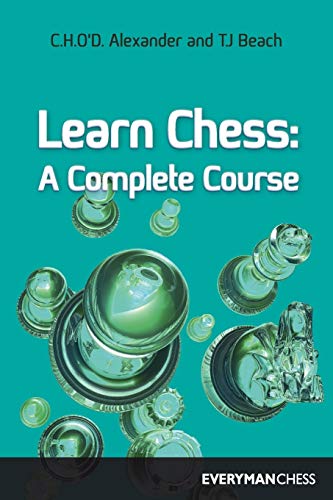
A Book of Chess (Hutchinson) 1973; The Penguin Book of Chess Positions (Penguin) 1973.
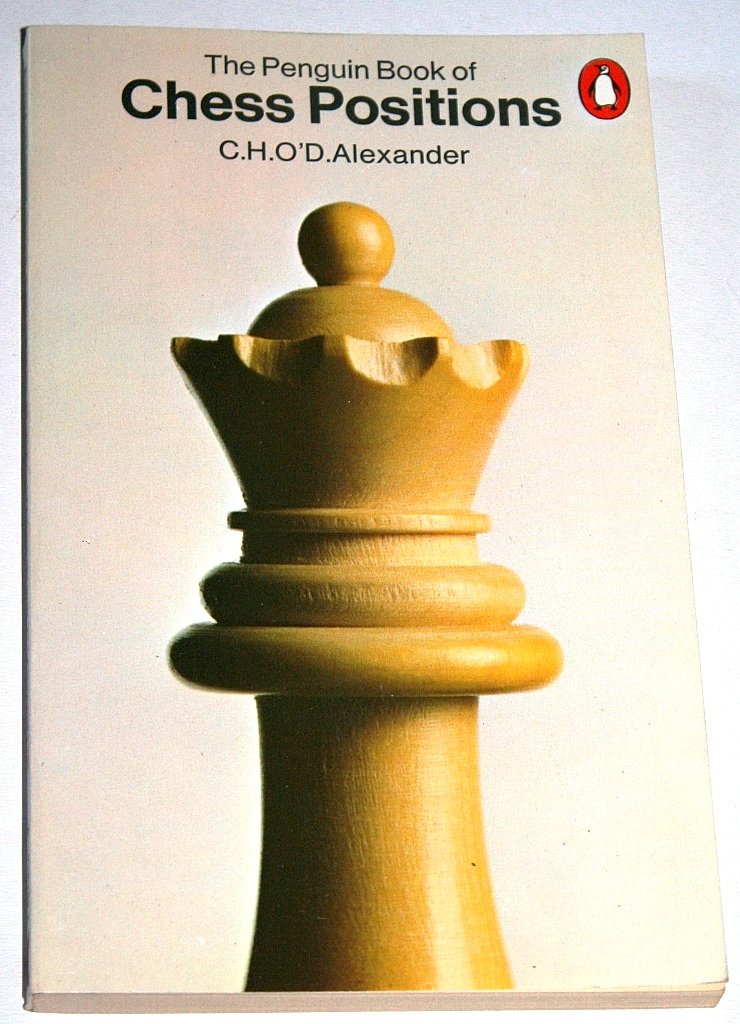
Here is an interesting article on his film appearance.
Here is his detailed Wikipedia entry
According to C.N. 10817 Hugh lived at various addresses when working at GCHQ :
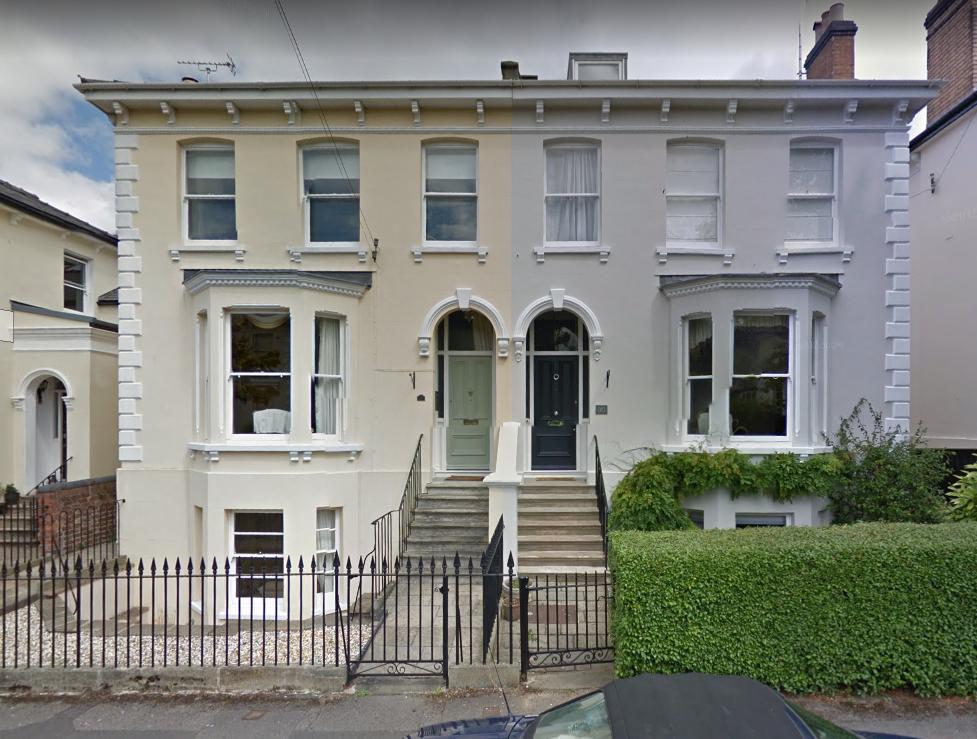
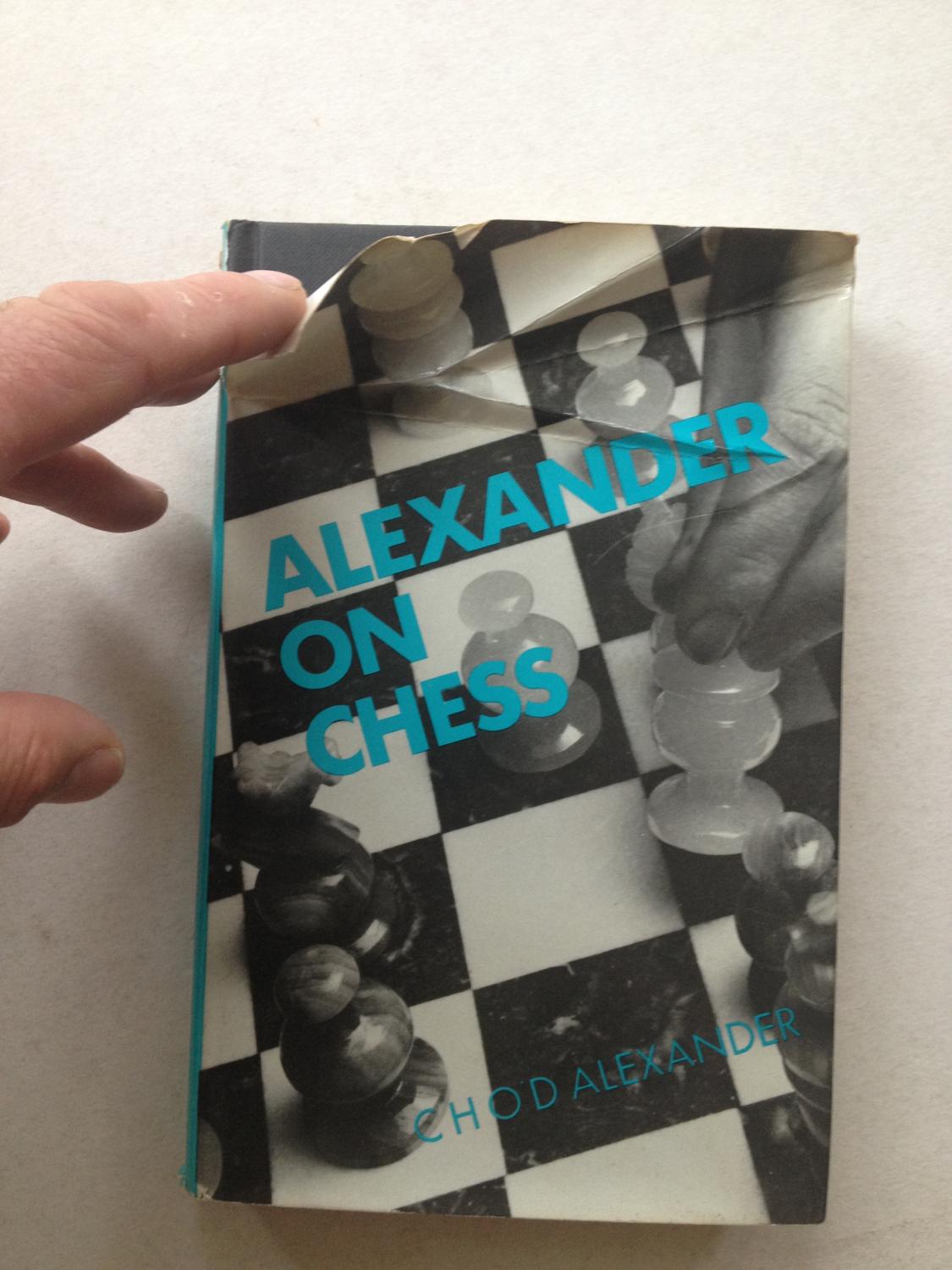

Golombek and Hartston, The Best Games of C.H.O’D. Alexander (1976).
We remember Hugh Alexander who passed away on Friday, 15-ii-1974. The death was registered in the Borough of Cheltenham. Currently his burial / cremation site is unknown.
Conel Hugh O’Donel Alexander was born on Monday, April 19th, 1909 in Cork, Munster, Republic of Ireland.

Hugh’s parents were Conel William Long Alexander (1879-1920) and Hilda Barbara Alexander (née Bennett) (1881-1964) who married in Hook Church, Hampshire. His father was a Professor of Civil Engineering from County Donegal and his mother was the daughter of a timber merchant and was from Birmingham.
Hugh’s father moved to Hook in Hampshire. At some point they returned to Cork and then relocated to Birmingham.
In the 1911 Irish census aged two Hugh was recorded as being a Presbyterian. The household consisted of his father, mother and two servants Maud McAuliffe (19) from County Cork and Johanna Hanlon (20) from Cork City all living at 20, Connaught Avenue, Cork.
At the time of the census all members of the household were capable of reading and writing apart from Hugh who was recorded as “cannot read”.
and Hugh’s father signed the Return as follows :


Hugh attended Londonderry College and then went to King Edward’s School, Birmingham.
Hugh married Enid Constance Rose Crichton Neate (1900-1982) in October 1934 and the marriage was registered in the district of Westminster, Middlesex.
According to Rodric Braithwaite :
“Enid, was an equally striking personality. She was descended from one of the defenders of the Eureka Stockade, the “birthplace of Australian democracy”. She was educated at the Sorbonne, a formidable dialectician, art historian and collector. In her later years she returned to Australia, where she was endlessly hospitable to passing Russian chessplayers, and to itinerant musicians, including my own father.”
Hugh and Enid had a son Michael (19 June 1936 – 1 June 2002) who became the foreign policy secretary to Margaret Thatcher and the UK ambassador to NATO. Here is Michael’s obituary.
Michael married Traute Krohn. Michael and Traute gave Hugh a grandson, Conel Alexander who is a Cosmochemist at the Earth and Planets Laboratory, Carnegie Institution for Science, Washington.

Prior to the second world war Alexander was officially employed by John Spedan Lewis in his Department store in Oxford Street. When he returned from Buenos Aires (“good air”) from the 1939 Olympiad he travelled aboard the RMS Alcantara. Here is the entry in the passenger list for September 19th, 1939 :

and here is Alexander’s entry in detail. Note that his occupation is described as “Drapery Manager” :

Hugh sailed from Buenos Aires, Argentina in September 1939 to arrive at Southampton September 19th 1939. The ship was the Alcantara operated by Royal Mail Lines Ltd hence the RMS Alcantara.

According to Wikipedia : “RMS Alcantara was a Royal Mail Lines ocean liner that was built in Belfast in 1926. She served in the Second World War first as an armed merchant cruiser and then a troop ship, was returned to civilian service in 1948 and scrapped in 1958.
Ports of the voyage were : Buenos Aires; Montevideo; Santos and Rio de Janeiro and Hugh’s official number was 148151 and he travelled 2nd class. His proposed destination residential address was
316, Rodney House, Dolphin Square, London, SW1
According to Wikipedia : “The proximity of Dolphin Square to the Palace of Westminster and the headquarters of the intelligence agencies MI5 (Thames House) and MI6 (Vauxhall Cross) has attracted many politicians, peers, civil servants and intelligence agency personnel as residents.”

There was some discussion of Drapery Manager in another place.
From British Chess Magazine, Volume XCIV (94, 1974), Number 4 (April), pp. 117-120 by PS Milner-Barry :
“A proper assessment of Hugh Alexander, who died on February 15th 1974 must await a later issue. But I think he might have been pleased to see our last game published, and I give the score of it below, with notes based on our usual analysis immediately after the game. Over the past 45 years, ever since he went to Cambridge, we played whenever opportunity offered serious games with clocks.

Before the war they were played mostly at my mother’s house in Cambridge, and after the war and my own marriage at our house in Blackheath. When he moved to Cheltenham the opportunities became fewer but no year ever passed without two or three such games, usually at Easter or Christmas.
Alexander always used to say, it was certainly true of me, that this was the kind of chess that he enjoyed most. The games were conducted with the utmost vigour, though not without a good deal of propaganda on both sides. I suppose he won in the proportion of about two to one, but the disparity in strength never became one-sided. Nearly all the games opened 1 P-K4, P-K4; he played the Lopez when I allowed him. (I usually played the Petroff or Philidor), and I played a mixture – in the early days the Vienna and latterly mostly the King’s Gambit. On the whole Black did better than White for both of us.

The only concession we made to advancing years was that latterly we contented ourselves with four hour sessions and 36 moves, instead of 40 in 5 hours. We thought we had done enough for honour by then, and the games were usually finished in the time.
Hugh stayed with us the weekend before Christmas, when this game was played. He looked ill, but he was very cheerful and as good company as ever. He loved a good argument, and as my family so too,- the evening meal was its usual lively affair! I am myself a man of peace, and intellectually lazy; so in deference to my feelings the argument was suspended, before it became too hot. I am afraid they all thought I was a spoil-sport. It was as happy a visit as any of us could remember and it is difficult to accept there will not be another.
As for the game, it was not one of our most exciting encounters. But it is quite an interesting one, and shows Hugh playing as
well as ever – certainly much too well for me. But then he usually did.”
Following PSMBs contribution, in the same obituary there was this from Harry Golombek :
I have written elsewhere about Hugh Alexander both as a person and as a chess-player and I also intend to devote a forthcoming article in ‘The Times‘ on Saturday to an appraisal of his place in British Chess. Here, however, I would like to describe briefly his connection with this magazine over the years and to show how
important his help was to the progress of the ‘BCM‘.
In the years immediately preceding the Second World War, Ash Wheatcroft and I had made a determined effort to maintain and increase the role of the ‘BCM‘, he in a managerial capacity and I as its editor. With the coming of war and the departure of both of us into the army a sort of caretaker regime had to be provided. It worked as well as could have been expected but inevitably there had been a decline both in quality and financially. When peace came, the quality improved since it was possible to get more and better contributions but the financial aspect became almost alarming.
The question arose – was there a need for the magazine and if so how could that need be fulfilled with the fairly limited resources at hand. Some of us thought there was, but the ways and means were not so clear. Of all those who thought like this Alexander was the most effective in his approach to the problems. I know that from his very youth onwards he had been convinced of the importance of the ‘BCM’ to British chess and, being a practical idealist, when the
crisis came he set about dealing with it in the most expeditious way.
In November 1946 he became a director of the B.C.M. and continued in that position till February 1952, by which time the magazine had been set on a solid basis from
which it was unlikely to be shaken. It was his idea that Brian Reilly be asked to act as editor and almost his first act as director was to write a letter to him inviting him to become so. Then, in January 1947, he himself took over the editorship of the games department, an arduous task which he fulfilled with great competence and the utmost conscientiousness until May 1949 when the heavy work of the Civil Service department of which he was head compelled him to hand over the Games Section to me.
Before, however, that he gave up this post he, again in the most practical way possible, rendered the ‘BCM‘ another service. He wrote a book giving a selection of the games from the last period of Alekhine’s life and generously donated half the royalties to the ‘BCM‘ in order to bolster up its slender finances.

Even after he had to give up official connection with the magazine he retained a strong interest in its welfare. So, even though this recognition is belated and posthumous, I thought it was right to afford readers the possibility of joining with me in thanking High Alexander for all that he did in this respect in especial. At any rate, such matters should be on record for the chess historian.
From The Anglo-Soviet Radio Chess Match by E.Klein and W.Winter :
“CHO’D Alexander was born in Cork in 1909 and learned chess at the age of ten. He was educated at King Edward School, Birmingham, where he exhibited early prowess by winning the Birmingham Post Cup. In 1927 he won the British Boy’s Championship. During his student days, from 1928 to 1932, he was a convincing champion of Cambridge University. Subsequently he competed in five British Championships, winning the title in 1938. He also played in several international tournaments, his outstanding performance amongst these being Hastings in 1938, where he shared second and third prizes with Keres, following Reshevsky who won the tournament, and ahead of Fine and Flohr. In 1939, in the England-Holland match, he had the satisfaction of defeating the ex-World Champion, Dr. Euwe, in a sensational games, drawing the return game.
A brilliant mathematician, he took a first at Cambridge and chose a scholastic career, joining a well-known public school (Winchester College). From there, via a short spell in a business appointment (John Lewis), he entered the service of the Foreign Office, where, during the war years, his valuable work earned him the OBE.
He plays imaginative and courageous chess and is never afraid of the wildest complications.”

From British Chess Magazine, Volume XCIV (94, 1974), Number 6 (June), pp. 202-204 by PS Milner-Barry :
With the death of Hugh Alexander at the age of 64, British chess has lost the outstanding figure of the past forty years. His active playing career over some thirty years included two victories in the British championship and regular appearances in all representative teams from l93l-58, except when the nature of his Civil Service
duties prevented him from travelling behind the Iron Curtain. During the whole of the period after the war he was the regular top board for the England team. In the Hastings international congress he twice won the Premier tournament, on the second occasion tying with Bronstein. His victories in this series included two world champions (Euwe and Botvinnik) and numerous others in the Grandmaster class. He was an outstanding example, like H.E.Atkins and Dr. Milan Vidmar, of the amateur who could combine an exacting professional life of great responsibility and distinction with success in competitive international chess at the highest level and with the increasing professionalism of the game and the demands of knowledge and research that it makes upon the masters, this was much more difficult in Hugh’s time than in an earlier age.
It was indeed in the international field that his fame will principally rest. On the British championship scene, although he always did well before the War, and won convincingly at Brighton in 1938 in a strong field, his record did not match his abilities. He never established anything like the superiority over his contemporaries that Atkins in a former age and Penrose in a later achieved. He won the championship again, in 1956, but that was a weak year when the Moscow Olympiad took first claim on the leading British players. It was not that he cared less – like all the great players he hated losing, though he was the most magnanimous of opponents – but that he seemed to require the stimulus of the great occasion, and of a world famous name on the other side of the board, to bring out the best in him.

Alexander was perhaps the only English player of his day whom the Grandmasters would have treated as on a level with themselves. On his day he was liable to beat any of them, and they were well aware of it. In his younger days he was very much the gay cavalier, and a brilliant combinative and attacking player with a touch of genius. Latterly he lost some of this elan, and adapted his style to the responsibilities of the B.C.T. top board. His opponents too, with a healthy respect for his powers, were less inclined to give him opportunities. He was as capable of the dead-bat technique as anybody, and to that extent (to my way of thinking anyway) his games became less interesting, with quick draws making a higher contribution to his top-board results than in earlier years. But none the less he was the anchor-man of the British team until his retirement after the 1958 Olympiad.

It was a great pity he gave up the game over the board at 50. He had years of good chess in him. But I think he felt he had scaled all the peaks he could scale, and that he was finding top-class competitive chess a burden difficult to reconcile with his Civil Service work and the prospect of a gradual and inevitable decline in his powers did not appeal to him. I made many efforts to tempt him back to the arena, but to no avail. I do not think he ever seriously regretted his decision, and in his last years he immensely enjoyed correspondence chess.
In 1964, Alexander became non-playing captain of the B.C.F. team, and held that role continuously until after the Siegen Olympiad in 1970.

It was rather a disappointing period for British chess, and the results, while we were rebuilding a young team, could not – even with Penrose’s outstanding efforts at top board – have been expected to be favourable. But he threw himself wholeheartedly into all the work sponsored by the B.C.F. and the Friends of Chess to find and develop talent in the younger generation, and before he died the fruits of these labours were beginning to appear. He would have been proud indeed to have witnessed our recent triumph in the Anglo-German match.
As a captain he was, of course, immensely liked and respected by his team. My impression was that he took his responsibilities almost too seriously, and agonised too
much over his decisions about whom to play and whom to rest. Nevertheless on balance he thoroughly enjoyed the work, and certainly, in spite of his innate modesty, he
was never one to be disturbed by ill-informed or irresponsible criticism, of which he had his share.

I suppose his most famous tournament result was his equal first with Bronstein at the Hastings Christmas Congress of 1953. Coming at a time when we were gloomily resigned to British players bringing up the rear in international tournaments, this created a great sensation.
The game with Bronstein lasted over 100 moves and Alexander won a most difficult Queen and Pawn ending by impeccable technique.


He went on with the Black pieces to massacre Tolush, the other visiting Russian Grandmaster.
Immense interest was created by this event. The popular press carried diagrams of the successive phases of the Bronstein saga. It was reported on the radio. By comparison with the furore created by the Spassky/Fischer match, it was no doubt small beer, but for those days the publicity was tremendous, and Alexander became the
hero of the hour.
It was entirely characteristic of him that this adulation did not go to his head. He kept everything in proportion, and encouraged everybody else to do the same. He said all the right things about Bronstein, but he did not claim, as one tends to do on these emotional occasions, that international sport was a panacea for friendship between the nations. Altogether it seemed to me an impeccable performance both on and off the board.

It is as a player that Hugh would, I think, have best wished to be remembered; and I have left myself little room to say anything about him as a journalist and writer. We are blessed, as readers of the B.C.M. will know, with many good and interesting writers on the game. But Hugh had, I believe, exceptional talents as a journalist. In his columns in the ‘Sunday Times‘, and latterly the ‘Financial Times‘, he set a very high standard. He always had something fresh and original to say, especially, I think, to the intelligent amateur rather than the expert; and he said it in a way that was both disarmingly modest and yet lively and entertaining. The warmth of his personality came out clearly both in his writing and in his public speaking – both were entirely natural and wholly without amour-propre.
His articles gave great pleasure to a wide circle, and many who never met him in the flesh must have felt that they had come to know him as a person. Similarly his book on the Spassky-Fischer match

(like the ‘Book of Chess’, which was written in the last year of his life) is an extremely vivid, as well as scholarly, piece of writing. It is almost impossible to believe that it was completed, within days of the conclusion of the match, by a man apparently under sentence of death throughout its progress.

Now that it has come, the loss of Hugh Alexander to British chess and chessplayers, alike as player, writer, administrator and friend, is immeasurable.
From CHESS, Volume 39 (1974), Nos. 693-94, March, p.162 by BH Wood :
The death of Conel Hugh O’Donel Alexander deprived English chess of one of its most vivid characters. Born l9th April 1909, he learnt chess at the age of 8.
From a Londonderry college he went to King Edward’s School, Birmingham, where as a schoolboy he won the Birmingham Post cup, which carries with it the unofficial championship of Staffordshire, Warwickshire and Worcestershire. Going on to Cambridge, he not only won the University championship four years in succession, but picked up first-class honours. He won the British championship in 1938.
In 1939 I found myself on a boat with him bound for the Chess Olympiad in Buenos
Aires. He was team captain with Sir George Thomas, P. S. Milner-Barry and H. Golombek
other distinguished members of the team.

War broke out after about six rounds. With typical determination, Alexander jettisoned chess for patriotism, caught a boat home, volunteered for service on disembarking, and within a few weeks had attained the rank of colonel in British Intelligence. He remained attached to Intelligence and the Foreign Office until his
retirement a few months ago. As a curious consequence of this commitment, though he settled in to the team captaincy for the British Chess Federation in the biennial chess Olympiads and participated in many chess events abroad, he was never allowed to travel anywhere behind the iron Curtain.
His fame certainly did, however. In the radio match, Britain v USSR in 1946, the most important event in British chess for a decade before and after, he found himself pitted against Mikhail Botvinnik, then at the height of his powers and destined to hold the world championship for 14 years. The first game he lost; the second he won, in superb style. His great adversary was outplayed.
He had some great years at Hastings. A 120 move victory over Bronstein with a queen and pawns endgame stretching over l3 hours through 3 days, earned headlines in the national press unequalled until the Spassky-Fischer furore of 1972, won him first place in 1954 and started him with a chess column in the Sunday Times. He was equal with Bronstein, above O’Kelly, Matanovic, Olafsson, Teschner, Tolush, Tartakover, Wade and Horne.
Hastings illustrated Alexander’s weaknesses as well as his strengths. Twice he won the premier tournament there, only to finish among the tail-enders the year after. Only once more was he to win the British champ- ionship; in a rather weak field, entering at the last minute with typical opportunism.
He was a brilliant conversationalist and speaker, a fine bridge player, a master mathematician, an expert on codes, a first-class journalist and writer. Among varied other interests were croquet and philately. He threw himself wholeheartedly into anything he did. His organization, “The Friends of Chess”, provided generous financial support for a wide range of chess events. A few days before his death he was full of plans for the future, including a big History of British Chess. He burnt himself out. The world of chess is a poorer and duller place without him.”
From Chessgames.com :
“Conel Hugh O’Donel Alexander was born in Cork, Ireland. Awarded the IM title in 1950 at its inception and the IMC title in 1970, he was British Champion in 1938 and 1956.
During the Second World War, he worked at Bletchley Park with Harry Golombek and Sir Philip Stuart Milner-Barry, deciphering German Enigma codes and later for the Foreign Office. Alexander finished 2nd= at Hastings (1937/38) tied with Paul Keres after Samuel Reshevsky and ahead of Salomon Flohr and Reuben Fine. He held Mikhail Botvinnik to an equal score (+1, -1) in the 1946 Anglo-Soviet Radio Match, and won Hastings (1946/47) while finishing equal first at Hastings (1953/54). He represented England on six Olympiad teams. Alexander was also an author of note. He passed away in Cheltenham in 1974.”

From The Oxford Companion to Chess by Hooper & Whyld :
International Master (1950), International Correspondence Chess Master (1970). Born in Cork, he settled in England as a boy. In spite or because of his intense application at the board his tournament performances were erratic. From about 1937 to the mid 1950s he was regarded as the strongest player in Great Britain, although he won only two (1938, 1956) of the 13 British Chess Federation Championships in which he competed; he played for the BCF in six Olympiads from 1933 to 1958. Holding a senior post at the Foreign Office, he was not permitted to play in countries under Soviet control or influence; but when he did compete abroad he achieved only moderate results. His best tournament achievement was at Hastings 1937-8 when he was second (+4=5) equal with Keres after Reshevsky ahead of Fine and Flohr; but he is better remembered for his tie with Bronstein for first prize at Hastings 1953-4. He won his game against Bronstein in 120 moves after several adjournments, and the outcome became a kind of serial in the press, arousing great national interest in the game. Alexander was the author of several books on chess, notably Alekhine’s Best Games of Chess 1938-1945 (1949) and A Book of Chess (1973).
From The Encyclopaedia of Chess by Anne Sunnucks :
For many years the chess correspondent of The Sunday Times, The Spectator (pseudonym Philidor) and the Evening News. There was probably no “chess name that was better known to the non-chess-playing element of the British public than that of Hugh Alexander. His victory over Russian Grandmaster David Bronstein at Hastings in 1953, after a struggle which lasted for 120 moves and took 13 hours, made chess front page news in the British press.
Born in Cork on 19th April 1909, Alexander picked up the game at prep school at the age of 8. In 1926 he won the Boy’s Championship, later to be recognised as the British Boy’s Championship, at Hastings. After coming down from Cambridge University, where he won the university championship four times, Alexander taught mathematics at Winchester College from 1932 to 1938. He later joined the Foreign Office.

One of the few British players who might have reached World Championship class if he had chosen to devote sufficient time to the game, Alexander was at his best when he faced a top class opponent.
During his chess career, he scored victories over two World Champions Botvinnik and Euwe, and he beat a number of other Grandmasters, international tournaments were all at Hastings where he came =2nd in 1938 with Keres, half a point behind Reshevsky and ahead of Fine and Flohr; 1st in 1947 and =1st with Bronstein in 1953. In 1951 tournament he came =5th.His other hobbies included bridge, croquet and philately, He was the Author of Alekhine’s Best Games of Chess 1938-1945 (Bell), Chess (Pitman) and joint author with T.J. Beach of Learn Chess; A New Way for All (Pergamon Press);

A Book of Chess (Hutchinson) 1973; The Penguin Book of Chess Positions (Penguin) 1973.

Here is an interesting article on his film appearance.
Here is his detailed Wikipedia entry
According to C.N. 10817 Hugh lived at various addresses when working at GCHQ :



Golombek and Hartston, The Best Games of C.H.O’D. Alexander (1976).
We remember Hugh Alexander who passed away on Friday, 15-ii-1974. The death was registered in the Borough of Cheltenham. Currently his burial / cremation site is unknown.
Conel Hugh O’Donel Alexander was born on Monday, April 19th, 1909 in Cork, Munster, Republic of Ireland.

Hugh’s parents were Conel William Long Alexander (1879-1920) and Hilda Barbara Alexander (née Bennett) (1881-1964) who married in Hook Church, Hampshire. His father was a Professor of Civil Engineering from County Donegal and his mother was the daughter of a timber merchant and was from Birmingham.
Hugh’s father moved to Hook in Hampshire. At some point they returned to Cork and then relocated to Birmingham.
In the 1911 Irish census aged two Hugh was recorded as being a Presbyterian. The household consisted of his father, mother and two servants Maud McAuliffe (19) from County Cork and Johanna Hanlon (20) from Cork City all living at 20, Connaught Avenue, Cork.
At the time of the census all members of the household were capable of reading and writing apart from Hugh who was recorded as “cannot read”.
and Hugh’s father signed the Return as follows :


Hugh attended Londonderry College and then went to King Edward’s School, Birmingham.
Hugh married Enid Constance Rose Crichton Neate (1900-1982) in October 1934 and the marriage was registered in the district of Westminster, Middlesex.
According to Rodric Braithwaite :
“Enid, was an equally striking personality. She was descended from one of the defenders of the Eureka Stockade, the “birthplace of Australian democracy”. She was educated at the Sorbonne, a formidable dialectician, art historian and collector. In her later years she returned to Australia, where she was endlessly hospitable to passing Russian chessplayers, and to itinerant musicians, including my own father.”
Hugh and Enid had a son Michael (19 June 1936 – 1 June 2002) who became the foreign policy secretary to Margaret Thatcher and the UK ambassador to NATO. Here is Michael’s obituary.
Michael married Traute Krohn. Michael and Traute gave Hugh a grandson, Conel Alexander who is a Cosmochemist at the Earth and Planets Laboratory, Carnegie Institution for Science, Washington.

Prior to the second world war Alexander was officially employed by John Spedan Lewis in his Department store in Oxford Street. When he returned from Buenos Aires (“good air”) from the 1939 Olympiad he travelled aboard the RMS Alcantara. Here is the entry in the passenger list for September 19th, 1939 :

and here is Alexander’s entry in detail. Note that his occupation is described as “Drapery Manager” :

Hugh sailed from Buenos Aires, Argentina in September 1939 to arrive at Southampton September 19th 1939. The ship was the Alcantara operated by Royal Mail Lines Ltd hence the RMS Alcantara.

According to Wikipedia : “RMS Alcantara was a Royal Mail Lines ocean liner that was built in Belfast in 1926. She served in the Second World War first as an armed merchant cruiser and then a troop ship, was returned to civilian service in 1948 and scrapped in 1958.
Ports of the voyage were : Buenos Aires; Montevideo; Santos and Rio de Janeiro and Hugh’s official number was 148151 and he travelled 2nd class. His proposed destination residential address was
316, Rodney House, Dolphin Square, London, SW1
According to Wikipedia : “The proximity of Dolphin Square to the Palace of Westminster and the headquarters of the intelligence agencies MI5 (Thames House) and MI6 (Vauxhall Cross) has attracted many politicians, peers, civil servants and intelligence agency personnel as residents.”

There was some discussion of Drapery Manager in another place.
From British Chess Magazine, Volume XCIV (94, 1974), Number 4 (April), pp. 117-120 by PS Milner-Barry :
“A proper assessment of Hugh Alexander, who died on February 15th 1974 must await a later issue. But I think he might have been pleased to see our last game published, and I give the score of it below, with notes based on our usual analysis immediately after the game. Over the past 45 years, ever since he went to Cambridge, we played whenever opportunity offered serious games with clocks.

Before the war they were played mostly at my mother’s house in Cambridge, and after the war and my own marriage at our house in Blackheath. When he moved to Cheltenham the opportunities became fewer but no year ever passed without two or three such games, usually at Easter or Christmas.
Alexander always used to say, it was certainly true of me, that this was the kind of chess that he enjoyed most. The games were conducted with the utmost vigour, though not without a good deal of propaganda on both sides. I suppose he won in the proportion of about two to one, but the disparity in strength never became one-sided. Nearly all the games opened 1 P-K4, P-K4; he played the Lopez when I allowed him. (I usually played the Petroff or Philidor), and I played a mixture – in the early days the Vienna and latterly mostly the King’s Gambit. On the whole Black did better than White for both of us.

The only concession we made to advancing years was that latterly we contented ourselves with four hour sessions and 36 moves, instead of 40 in 5 hours. We thought we had done enough for honour by then, and the games were usually finished in the time.
Hugh stayed with us the weekend before Christmas, when this game was played. He looked ill, but he was very cheerful and as good company as ever. He loved a good argument, and as my family so too,- the evening meal was its usual lively affair! I am myself a man of peace, and intellectually lazy; so in deference to my feelings the argument was suspended, before it became too hot. I am afraid they all thought I was a spoil-sport. It was as happy a visit as any of us could remember and it is difficult to accept there will not be another.
As for the game, it was not one of our most exciting encounters. But it is quite an interesting one, and shows Hugh playing as
well as ever – certainly much too well for me. But then he usually did.”
Following PSMBs contribution, in the same obituary there was this from Harry Golombek :
I have written elsewhere about Hugh Alexander both as a person and as a chess-player and I also intend to devote a forthcoming article in ‘The Times‘ on Saturday to an appraisal of his place in British Chess. Here, however, I would like to describe briefly his connection with this magazine over the years and to show how
important his help was to the progress of the ‘BCM‘.
In the years immediately preceding the Second World War, Ash Wheatcroft and I had made a determined effort to maintain and increase the role of the ‘BCM‘, he in a managerial capacity and I as its editor. With the coming of war and the departure of both of us into the army a sort of caretaker regime had to be provided. It worked as well as could have been expected but inevitably there had been a decline both in quality and financially. When peace came, the quality improved since it was possible to get more and better contributions but the financial aspect became almost alarming.
The question arose – was there a need for the magazine and if so how could that need be fulfilled with the fairly limited resources at hand. Some of us thought there was, but the ways and means were not so clear. Of all those who thought like this Alexander was the most effective in his approach to the problems. I know that from his very youth onwards he had been convinced of the importance of the ‘BCM’ to British chess and, being a practical idealist, when the
crisis came he set about dealing with it in the most expeditious way.
In November 1946 he became a director of the B.C.M. and continued in that position till February 1952, by which time the magazine had been set on a solid basis from
which it was unlikely to be shaken. It was his idea that Brian Reilly be asked to act as editor and almost his first act as director was to write a letter to him inviting him to become so. Then, in January 1947, he himself took over the editorship of the games department, an arduous task which he fulfilled with great competence and the utmost conscientiousness until May 1949 when the heavy work of the Civil Service department of which he was head compelled him to hand over the Games Section to me.
Before, however, that he gave up this post he, again in the most practical way possible, rendered the ‘BCM‘ another service. He wrote a book giving a selection of the games from the last period of Alekhine’s life and generously donated half the royalties to the ‘BCM‘ in order to bolster up its slender finances.

Even after he had to give up official connection with the magazine he retained a strong interest in its welfare. So, even though this recognition is belated and posthumous, I thought it was right to afford readers the possibility of joining with me in thanking High Alexander for all that he did in this respect in especial. At any rate, such matters should be on record for the chess historian.
From The Anglo-Soviet Radio Chess Match by E.Klein and W.Winter :
“CHO’D Alexander was born in Cork in 1909 and learned chess at the age of ten. He was educated at King Edward School, Birmingham, where he exhibited early prowess by winning the Birmingham Post Cup. In 1927 he won the British Boy’s Championship. During his student days, from 1928 to 1932, he was a convincing champion of Cambridge University. Subsequently he competed in five British Championships, winning the title in 1938. He also played in several international tournaments, his outstanding performance amongst these being Hastings in 1938, where he shared second and third prizes with Keres, following Reshevsky who won the tournament, and ahead of Fine and Flohr. In 1939, in the England-Holland match, he had the satisfaction of defeating the ex-World Champion, Dr. Euwe, in a sensational games, drawing the return game.
A brilliant mathematician, he took a first at Cambridge and chose a scholastic career, joining a well-known public school (Winchester College). From there, via a short spell in a business appointment (John Lewis), he entered the service of the Foreign Office, where, during the war years, his valuable work earned him the OBE.
He plays imaginative and courageous chess and is never afraid of the wildest complications.”

From British Chess Magazine, Volume XCIV (94, 1974), Number 6 (June), pp. 202-204 by PS Milner-Barry :
With the death of Hugh Alexander at the age of 64, British chess has lost the outstanding figure of the past forty years. His active playing career over some thirty years included two victories in the British championship and regular appearances in all representative teams from l93l-58, except when the nature of his Civil Service
duties prevented him from travelling behind the Iron Curtain. During the whole of the period after the war he was the regular top board for the England team. In the Hastings international congress he twice won the Premier tournament, on the second occasion tying with Bronstein. His victories in this series included two world champions (Euwe and Botvinnik) and numerous others in the Grandmaster class. He was an outstanding example, like H.E.Atkins and Dr. Milan Vidmar, of the amateur who could combine an exacting professional life of great responsibility and distinction with success in competitive international chess at the highest level and with the increasing professionalism of the game and the demands of knowledge and research that it makes upon the masters, this was much more difficult in Hugh’s time than in an earlier age.
It was indeed in the international field that his fame will principally rest. On the British championship scene, although he always did well before the War, and won convincingly at Brighton in 1938 in a strong field, his record did not match his abilities. He never established anything like the superiority over his contemporaries that Atkins in a former age and Penrose in a later achieved. He won the championship again, in 1956, but that was a weak year when the Moscow Olympiad took first claim on the leading British players. It was not that he cared less – like all the great players he hated losing, though he was the most magnanimous of opponents – but that he seemed to require the stimulus of the great occasion, and of a world famous name on the other side of the board, to bring out the best in him.

Alexander was perhaps the only English player of his day whom the Grandmasters would have treated as on a level with themselves. On his day he was liable to beat any of them, and they were well aware of it. In his younger days he was very much the gay cavalier, and a brilliant combinative and attacking player with a touch of genius. Latterly he lost some of this elan, and adapted his style to the responsibilities of the B.C.T. top board. His opponents too, with a healthy respect for his powers, were less inclined to give him opportunities. He was as capable of the dead-bat technique as anybody, and to that extent (to my way of thinking anyway) his games became less interesting, with quick draws making a higher contribution to his top-board results than in earlier years. But none the less he was the anchor-man of the British team until his retirement after the 1958 Olympiad.

It was a great pity he gave up the game over the board at 50. He had years of good chess in him. But I think he felt he had scaled all the peaks he could scale, and that he was finding top-class competitive chess a burden difficult to reconcile with his Civil Service work and the prospect of a gradual and inevitable decline in his powers did not appeal to him. I made many efforts to tempt him back to the arena, but to no avail. I do not think he ever seriously regretted his decision, and in his last years he immensely enjoyed correspondence chess.
In 1964, Alexander became non-playing captain of the B.C.F. team, and held that role continuously until after the Siegen Olympiad in 1970.

It was rather a disappointing period for British chess, and the results, while we were rebuilding a young team, could not – even with Penrose’s outstanding efforts at top board – have been expected to be favourable. But he threw himself wholeheartedly into all the work sponsored by the B.C.F. and the Friends of Chess to find and develop talent in the younger generation, and before he died the fruits of these labours were beginning to appear. He would have been proud indeed to have witnessed our recent triumph in the Anglo-German match.
As a captain he was, of course, immensely liked and respected by his team. My impression was that he took his responsibilities almost too seriously, and agonised too
much over his decisions about whom to play and whom to rest. Nevertheless on balance he thoroughly enjoyed the work, and certainly, in spite of his innate modesty, he
was never one to be disturbed by ill-informed or irresponsible criticism, of which he had his share.

I suppose his most famous tournament result was his equal first with Bronstein at the Hastings Christmas Congress of 1953. Coming at a time when we were gloomily resigned to British players bringing up the rear in international tournaments, this created a great sensation.
The game with Bronstein lasted over 100 moves and Alexander won a most difficult Queen and Pawn ending by impeccable technique.


He went on with the Black pieces to massacre Tolush, the other visiting Russian Grandmaster.
Immense interest was created by this event. The popular press carried diagrams of the successive phases of the Bronstein saga. It was reported on the radio. By comparison with the furore created by the Spassky/Fischer match, it was no doubt small beer, but for those days the publicity was tremendous, and Alexander became the
hero of the hour.
It was entirely characteristic of him that this adulation did not go to his head. He kept everything in proportion, and encouraged everybody else to do the same. He said all the right things about Bronstein, but he did not claim, as one tends to do on these emotional occasions, that international sport was a panacea for friendship between the nations. Altogether it seemed to me an impeccable performance both on and off the board.

It is as a player that Hugh would, I think, have best wished to be remembered; and I have left myself little room to say anything about him as a journalist and writer. We are blessed, as readers of the B.C.M. will know, with many good and interesting writers on the game. But Hugh had, I believe, exceptional talents as a journalist. In his columns in the ‘Sunday Times‘, and latterly the ‘Financial Times‘, he set a very high standard. He always had something fresh and original to say, especially, I think, to the intelligent amateur rather than the expert; and he said it in a way that was both disarmingly modest and yet lively and entertaining. The warmth of his personality came out clearly both in his writing and in his public speaking – both were entirely natural and wholly without amour-propre.
His articles gave great pleasure to a wide circle, and many who never met him in the flesh must have felt that they had come to know him as a person. Similarly his book on the Spassky-Fischer match

(like the ‘Book of Chess’, which was written in the last year of his life) is an extremely vivid, as well as scholarly, piece of writing. It is almost impossible to believe that it was completed, within days of the conclusion of the match, by a man apparently under sentence of death throughout its progress.

Now that it has come, the loss of Hugh Alexander to British chess and chessplayers, alike as player, writer, administrator and friend, is immeasurable.
From CHESS, Volume 39 (1974), Nos. 693-94, March, p.162 by BH Wood :
The death of Conel Hugh O’Donel Alexander deprived English chess of one of its most vivid characters. Born l9th April 1909, he learnt chess at the age of 8.
From a Londonderry college he went to King Edward’s School, Birmingham, where as a schoolboy he won the Birmingham Post cup, which carries with it the unofficial championship of Staffordshire, Warwickshire and Worcestershire. Going on to Cambridge, he not only won the University championship four years in succession, but picked up first-class honours. He won the British championship in 1938.
In 1939 I found myself on a boat with him bound for the Chess Olympiad in Buenos
Aires. He was team captain with Sir George Thomas, P. S. Milner-Barry and H. Golombek
other distinguished members of the team.

War broke out after about six rounds. With typical determination, Alexander jettisoned chess for patriotism, caught a boat home, volunteered for service on disembarking, and within a few weeks had attained the rank of colonel in British Intelligence. He remained attached to Intelligence and the Foreign Office until his
retirement a few months ago. As a curious consequence of this commitment, though he settled in to the team captaincy for the British Chess Federation in the biennial chess Olympiads and participated in many chess events abroad, he was never allowed to travel anywhere behind the iron Curtain.
His fame certainly did, however. In the radio match, Britain v USSR in 1946, the most important event in British chess for a decade before and after, he found himself pitted against Mikhail Botvinnik, then at the height of his powers and destined to hold the world championship for 14 years. The first game he lost; the second he won, in superb style. His great adversary was outplayed.
He had some great years at Hastings. A 120 move victory over Bronstein with a queen and pawns endgame stretching over l3 hours through 3 days, earned headlines in the national press unequalled until the Spassky-Fischer furore of 1972, won him first place in 1954 and started him with a chess column in the Sunday Times. He was equal with Bronstein, above O’Kelly, Matanovic, Olafsson, Teschner, Tolush, Tartakover, Wade and Horne.
Hastings illustrated Alexander’s weaknesses as well as his strengths. Twice he won the premier tournament there, only to finish among the tail-enders the year after. Only once more was he to win the British champ- ionship; in a rather weak field, entering at the last minute with typical opportunism.
He was a brilliant conversationalist and speaker, a fine bridge player, a master mathematician, an expert on codes, a first-class journalist and writer. Among varied other interests were croquet and philately. He threw himself wholeheartedly into anything he did. His organization, “The Friends of Chess”, provided generous financial support for a wide range of chess events. A few days before his death he was full of plans for the future, including a big History of British Chess. He burnt himself out. The world of chess is a poorer and duller place without him.”
From Chessgames.com :
“Conel Hugh O’Donel Alexander was born in Cork, Ireland. Awarded the IM title in 1950 at its inception and the IMC title in 1970, he was British Champion in 1938 and 1956.
During the Second World War, he worked at Bletchley Park with Harry Golombek and Sir Philip Stuart Milner-Barry, deciphering German Enigma codes and later for the Foreign Office. Alexander finished 2nd= at Hastings (1937/38) tied with Paul Keres after Samuel Reshevsky and ahead of Salomon Flohr and Reuben Fine. He held Mikhail Botvinnik to an equal score (+1, -1) in the 1946 Anglo-Soviet Radio Match, and won Hastings (1946/47) while finishing equal first at Hastings (1953/54). He represented England on six Olympiad teams. Alexander was also an author of note. He passed away in Cheltenham in 1974.”

From The Oxford Companion to Chess by Hooper & Whyld :
International Master (1950), International Correspondence Chess Master (1970). Born in Cork, he settled in England as a boy. In spite or because of his intense application at the board his tournament performances were erratic. From about 1937 to the mid 1950s he was regarded as the strongest player in Great Britain, although he won only two (1938, 1956) of the 13 British Chess Federation Championships in which he competed; he played for the BCF in six Olympiads from 1933 to 1958. Holding a senior post at the Foreign Office, he was not permitted to play in countries under Soviet control or influence; but when he did compete abroad he achieved only moderate results. His best tournament achievement was at Hastings 1937-8 when he was second (+4=5) equal with Keres after Reshevsky ahead of Fine and Flohr; but he is better remembered for his tie with Bronstein for first prize at Hastings 1953-4. He won his game against Bronstein in 120 moves after several adjournments, and the outcome became a kind of serial in the press, arousing great national interest in the game. Alexander was the author of several books on chess, notably Alekhine’s Best Games of Chess 1938-1945 (1949) and A Book of Chess (1973).
From The Encyclopaedia of Chess by Anne Sunnucks :
For many years the chess correspondent of The Sunday Times, The Spectator (pseudonym Philidor) and the Evening News. There was probably no “chess name that was better known to the non-chess-playing element of the British public than that of Hugh Alexander. His victory over Russian Grandmaster David Bronstein at Hastings in 1953, after a struggle which lasted for 120 moves and took 13 hours, made chess front page news in the British press.
Born in Cork on 19th April 1909, Alexander picked up the game at prep school at the age of 8. In 1926 he won the Boy’s Championship, later to be recognised as the British Boy’s Championship, at Hastings. After coming down from Cambridge University, where he won the university championship four times, Alexander taught mathematics at Winchester College from 1932 to 1938. He later joined the Foreign Office.

One of the few British players who might have reached World Championship class if he had chosen to devote sufficient time to the game, Alexander was at his best when he faced a top class opponent.
During his chess career, he scored victories over two World Champions Botvinnik and Euwe, and he beat a number of other Grandmasters, international tournaments were all at Hastings where he came =2nd in 1938 with Keres, half a point behind Reshevsky and ahead of Fine and Flohr; 1st in 1947 and =1st with Bronstein in 1953. In 1951 tournament he came =5th.His other hobbies included bridge, croquet and philately, He was the Author of Alekhine’s Best Games of Chess 1938-1945 (Bell), Chess (Pitman) and joint author with T.J. Beach of Learn Chess; A New Way for All (Pergamon Press);

A Book of Chess (Hutchinson) 1973; The Penguin Book of Chess Positions (Penguin) 1973.

Here is an interesting article on his film appearance.
Here is his detailed Wikipedia entry
According to C.N. 10817 Hugh lived at various addresses when working at GCHQ :



Golombek and Hartston, The Best Games of C.H.O’D. Alexander (1976).